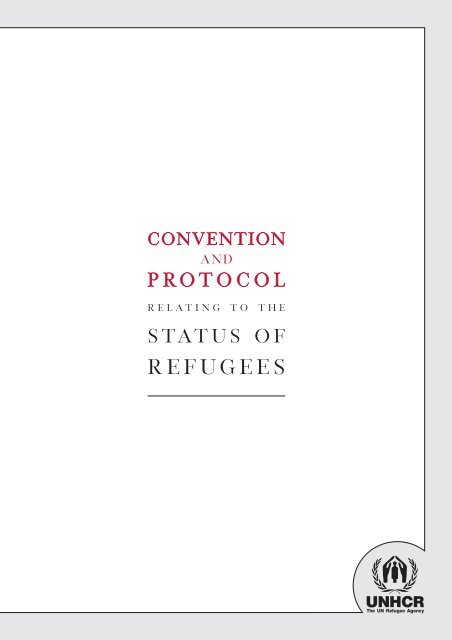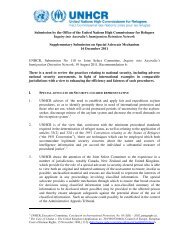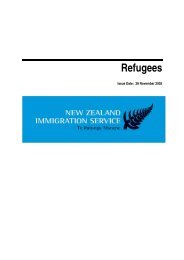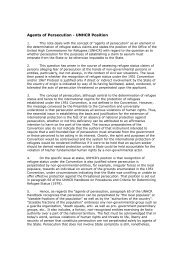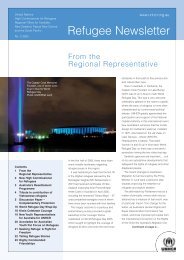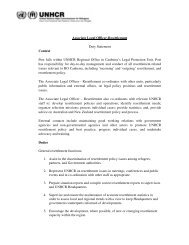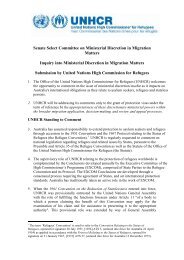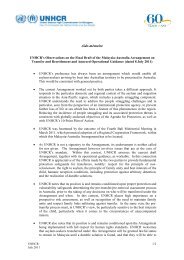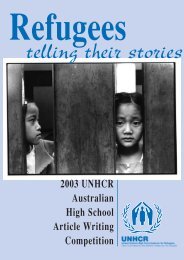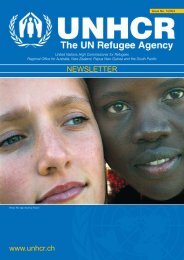1951 Convention and Protocol relating to the Status of Refugees
1951 Convention and Protocol relating to the Status of Refugees
1951 Convention and Protocol relating to the Status of Refugees
- No tags were found...
You also want an ePaper? Increase the reach of your titles
YUMPU automatically turns print PDFs into web optimized ePapers that Google loves.
Text <strong>of</strong> <strong>the</strong> <strong>1951</strong> <strong>Convention</strong>Relating <strong>to</strong> <strong>the</strong> <strong>Status</strong> <strong>of</strong> <strong>Refugees</strong>Text <strong>of</strong> <strong>the</strong> 1967 <strong>Pro<strong>to</strong>col</strong>Relating <strong>to</strong> <strong>the</strong> <strong>Status</strong> <strong>of</strong> <strong>Refugees</strong>Resolution 2198 (XXI) adopted by <strong>the</strong>United Nations General Assemblywith anIntroduc<strong>to</strong>ry Noteby <strong>the</strong> Office <strong>of</strong> <strong>the</strong>United Nations High Commissioner for <strong>Refugees</strong>c o n v e n t i o n a n d p r o t o c o l
States. As <strong>of</strong> 1 August 2007, <strong>the</strong>re were 147 States Parties <strong>to</strong> one or both <strong>of</strong><strong>the</strong>se instruments.By its statute, <strong>the</strong> Office <strong>of</strong> <strong>the</strong> High Commissioner is entrusted, inter alia,with <strong>the</strong> task <strong>of</strong> promoting international instruments for <strong>the</strong> protection<strong>of</strong> refugees, <strong>and</strong> supervising <strong>the</strong>ir application. Under <strong>the</strong> <strong>Convention</strong> <strong>and</strong><strong>Pro<strong>to</strong>col</strong>, contracting States undertake <strong>to</strong> cooperate with <strong>the</strong> Office <strong>of</strong>UNHCR in <strong>the</strong> exercise <strong>of</strong> its functions <strong>and</strong>, in particular, <strong>to</strong> facilitate itsspecific duty <strong>of</strong> supervising <strong>the</strong> application <strong>of</strong> <strong>the</strong> provisions <strong>of</strong> <strong>the</strong>se instruments.In view <strong>of</strong> <strong>the</strong> increasing recognition <strong>of</strong> <strong>the</strong> fundamental significance <strong>of</strong> <strong>the</strong><strong>Convention</strong> <strong>and</strong> <strong>the</strong> <strong>Pro<strong>to</strong>col</strong> for <strong>the</strong> protection <strong>of</strong> refugees <strong>and</strong> for <strong>the</strong> establishmen<strong>to</strong>f minimum st<strong>and</strong>ards for <strong>the</strong>ir treatment, it is important that<strong>the</strong>ir provisions should be known as widely as possible, both by refugees <strong>and</strong>by all those concerned with refugee problems.Information on accessions <strong>to</strong> <strong>the</strong> <strong>Convention</strong> <strong>and</strong> <strong>to</strong> <strong>the</strong> <strong>Pro<strong>to</strong>col</strong>, as well aso<strong>the</strong>r relevant details, may be obtained from UNHCR, or from <strong>the</strong> UNHCRwebsite at www.unhcr.org.Geneva, August 2007c o n v e n t i o n a n d p r o t o c o l
final ac<strong>to</strong>f <strong>the</strong> United Nations Conference <strong>of</strong> Plenipotentiarieson <strong>the</strong> <strong>Status</strong> <strong>of</strong> <strong>Refugees</strong> <strong>and</strong> Stateless PersonsI. The General Assembly <strong>of</strong> <strong>the</strong> United Nations, by Resolution 429 (V) <strong>of</strong> 14December 1950, decided <strong>to</strong> convene in Geneva a Conference <strong>of</strong> Plenipotentiaries<strong>to</strong> complete <strong>the</strong> drafting <strong>of</strong>, <strong>and</strong> <strong>to</strong> sign, a <strong>Convention</strong> <strong>relating</strong> <strong>to</strong> <strong>the</strong><strong>Status</strong> <strong>of</strong> <strong>Refugees</strong> <strong>and</strong> a <strong>Pro<strong>to</strong>col</strong> <strong>relating</strong> <strong>to</strong> <strong>the</strong> <strong>Status</strong> <strong>of</strong> Stateless Persons.The Conference met at <strong>the</strong> European Office <strong>of</strong> <strong>the</strong> United Nations in Genevafrom 2 <strong>to</strong> 25 July <strong>1951</strong>.The Governments <strong>of</strong> <strong>the</strong> following twenty-six States were represented bydelegates who all submitted satisfac<strong>to</strong>ry credentials or o<strong>the</strong>r communications<strong>of</strong> appointment authorizing <strong>the</strong>m <strong>to</strong> participate in <strong>the</strong> Conference:AustraliaAustriaBelgiumBrazilCanadaColombiaDenmarkEgyptFranceGermany, Federal Republic <strong>of</strong>GreeceHoly SeeIraqIsraelItalyLuxembourgMonacoNe<strong>the</strong>rl<strong>and</strong>sNorwaySwedenSwitzerl<strong>and</strong> (<strong>the</strong> Swiss delegation alsorepresented Liechtenstein)TurkeyUnited Kingdom <strong>of</strong> Great Britain<strong>and</strong> Nor<strong>the</strong>rn Irel<strong>and</strong>United States <strong>of</strong> AmericaVenezuelaYugoslaviaThe Governments <strong>of</strong> <strong>the</strong> following two States were represented by observers:CubaIranPursuant <strong>to</strong> <strong>the</strong> request <strong>of</strong> <strong>the</strong> General Assembly, <strong>the</strong> United Nations HighCommissioner for <strong>Refugees</strong> participated, without <strong>the</strong> right <strong>to</strong> vote, in <strong>the</strong>deliberations <strong>of</strong> <strong>the</strong> Conference.c o n v e n t i o n a n d p r o t o c o l
The International Labour Organisation <strong>and</strong> <strong>the</strong> International RefugeeOrganization were represented at <strong>the</strong> Conference without <strong>the</strong> right <strong>to</strong> vote.The Conference invited a representative <strong>of</strong> <strong>the</strong> Council <strong>of</strong> Europe <strong>to</strong> be representedat <strong>the</strong> Conference without <strong>the</strong> right <strong>to</strong> vote.Representatives <strong>of</strong> <strong>the</strong> following Non-Governmental Organizations inconsultative relationship with <strong>the</strong> Economic <strong>and</strong> Social Council were alsopresent as observers:CATEGORY AInternational Confederation <strong>of</strong> Free Trade UnionsInternational Federation <strong>of</strong> Christian Trade UnionsInter-Parliamentary UnionCATEGORY BAgudas Israel World OrganizationCaritas InternationalisCatholic International Union for Social ServiceCommission <strong>of</strong> <strong>the</strong> Churches on International AffairsConsultative Council <strong>of</strong> Jewish OrganizationsCo-ordinating Board <strong>of</strong> Jewish OrganizationsFriends’ World Committee for ConsultationInternational Association <strong>of</strong> Penal LawInternational Bureau for <strong>the</strong> Unification <strong>of</strong> Penal LawInternational Committee <strong>of</strong> <strong>the</strong> Red CrossInternational Council <strong>of</strong> WomenInternational Federation <strong>of</strong> Friends <strong>of</strong> Young WomenInternational League for <strong>the</strong> Rights <strong>of</strong> ManInternational Social ServiceInternational Union for Child WelfareInternational Union <strong>of</strong> Catholic Women’s LeaguesPax RomanaWomen’s International League for Peace <strong>and</strong> FreedomWorld Jewish CongressWorld Union for Progressive JudaismWorld Young Women’s Christian Associationc o n v e n t i o n a n d p r o t o c o l
REGISTERInternational Relief Committee for Intellectual WorkersLeague <strong>of</strong> Red Cross SocietiesSt<strong>and</strong>ing Conference <strong>of</strong> Voluntary AgenciesWorld Association <strong>of</strong> Girld Guides <strong>and</strong> Girl ScoutsWorld University ServiceRepresentatives <strong>of</strong> Non-Governmental Organizations which have beengranted consultative status by <strong>the</strong> Economic <strong>and</strong> Social Council as well asthose entered by <strong>the</strong> Secretary-General on <strong>the</strong> Register referred <strong>to</strong> in Resolution288 B (X) <strong>of</strong> <strong>the</strong> Economic <strong>and</strong> Social Council, paragraph 17, had under<strong>the</strong> rules <strong>of</strong> procedure adopted by <strong>the</strong> Conference <strong>the</strong> right <strong>to</strong> submit writtenor oral statements <strong>to</strong> <strong>the</strong> Conference.The Conference elected Mr. Knud Larsen, <strong>of</strong> Denmark, as President, <strong>and</strong> Mr.A. Herment, <strong>of</strong> Belgium, <strong>and</strong> Mr. Talat Miras, <strong>of</strong> Turkey, as Vice-Presidents.At its second meeting, <strong>the</strong> Conference, acting on a proposal <strong>of</strong> <strong>the</strong> representative<strong>of</strong> Egypt, unanimously decided <strong>to</strong> address an invitation <strong>to</strong> <strong>the</strong> Holy See<strong>to</strong> designate a plenipotentiary representative <strong>to</strong> participate in its work. A representative<strong>of</strong> <strong>the</strong> Holy See <strong>to</strong>ok his place at <strong>the</strong> Conference on 10 July <strong>1951</strong>.The Conference adopted as its agenda <strong>the</strong> Provisional Agenda drawn upby <strong>the</strong> Secretary-General (A/CONF.2/2/Rev.1). It also adopted <strong>the</strong> ProvisionalRules <strong>of</strong> Procedure drawn up by <strong>the</strong> Secretary-General, with <strong>the</strong> addition <strong>of</strong>a provision which authorized a representative <strong>of</strong> <strong>the</strong> Council <strong>of</strong> Europe <strong>to</strong> bepresent at <strong>the</strong> Conference without <strong>the</strong> right <strong>to</strong> vote <strong>and</strong> <strong>to</strong> submit proposals(A/CONF.2/3/Rev.1).In accordance with <strong>the</strong> Rules <strong>of</strong> Procedure <strong>of</strong> <strong>the</strong> Conference, <strong>the</strong> President<strong>and</strong> Vice-Presidents examined <strong>the</strong> credentials <strong>of</strong> representatives <strong>and</strong> on 17July <strong>1951</strong> reported <strong>to</strong> <strong>the</strong> Conference <strong>the</strong> results <strong>of</strong> such examination, <strong>the</strong>Conference adopting <strong>the</strong> report.The Conference used as <strong>the</strong> basis <strong>of</strong> its discussions <strong>the</strong> draft <strong>Convention</strong><strong>relating</strong> <strong>to</strong> <strong>the</strong> <strong>Status</strong> <strong>of</strong> <strong>Refugees</strong> <strong>and</strong> <strong>the</strong> draft <strong>Pro<strong>to</strong>col</strong> <strong>relating</strong> <strong>to</strong> <strong>the</strong> <strong>Status</strong><strong>of</strong> Stateless Persons prepared by <strong>the</strong> ad hoc Committee on <strong>Refugees</strong> <strong>and</strong>Stateless Persons at its second session held in Geneva from 14 <strong>to</strong> 25 August1950, with <strong>the</strong> exception <strong>of</strong> <strong>the</strong> preamble <strong>and</strong> Article 1 (Definition <strong>of</strong> <strong>the</strong> term10 c o n v e n t i o n a n d p r o t o c o l
“refugee”) <strong>of</strong> <strong>the</strong> draft <strong>Convention</strong>. The text <strong>of</strong> <strong>the</strong> preamble before <strong>the</strong> Conferencewas that which was adopted by <strong>the</strong> Economic <strong>and</strong> Social Council on11 August 1950 in Resolution 319 B II (XI). The text <strong>of</strong> Article 1 before <strong>the</strong>Conference was that recommended by <strong>the</strong> General Assembly on 14 December1950 <strong>and</strong> contained in <strong>the</strong> Annex <strong>to</strong> Resolution 429 (V). The latter was amodification <strong>of</strong> <strong>the</strong> text as it had been adopted by <strong>the</strong> Economic <strong>and</strong> SocialCouncil in Resolution 319 B II (XI).The Conference adopted <strong>the</strong> <strong>Convention</strong> <strong>relating</strong> <strong>to</strong> <strong>the</strong> <strong>Status</strong> <strong>of</strong> <strong>Refugees</strong>in two readings. Prior <strong>to</strong> its second reading it established a Style Committeecomposed <strong>of</strong> <strong>the</strong> President <strong>and</strong> <strong>the</strong> representatives <strong>of</strong> Belgium, France,Israel, Italy, <strong>the</strong> United Kingdom <strong>of</strong> Great Britain <strong>and</strong> Nor<strong>the</strong>rn Irel<strong>and</strong> <strong>and</strong><strong>the</strong> United States <strong>of</strong> America, <strong>to</strong>ge<strong>the</strong>r with <strong>the</strong> High Commissioner for <strong>Refugees</strong>,which elected as its Chairman Mr. G. Warren, <strong>of</strong> <strong>the</strong> United States <strong>of</strong>America. The Style Committee re-drafted <strong>the</strong> text which had been adoptedby <strong>the</strong> Conference on first reading, particularly from <strong>the</strong> point <strong>of</strong> view <strong>of</strong>language <strong>and</strong> <strong>of</strong> concordance between <strong>the</strong> English <strong>and</strong> French texts.The <strong>Convention</strong> was adopted on 25 July by 24 votes <strong>to</strong> none with no abstentions<strong>and</strong> opened for signature at <strong>the</strong> European Office <strong>of</strong> <strong>the</strong> United Nationsfrom 28 July <strong>to</strong> 31 August <strong>1951</strong>. It will be re-opened for signature at <strong>the</strong> permanen<strong>the</strong>adquarters <strong>of</strong> <strong>the</strong> United Nations in New York from 17 September<strong>1951</strong> <strong>to</strong> 31 December 1952.The English <strong>and</strong> French texts <strong>of</strong> <strong>the</strong> <strong>Convention</strong>, which are equally au<strong>the</strong>ntic,are appended <strong>to</strong> this Final Act.II. The Conference decided, by 17 votes <strong>to</strong> 3 with 3 abstentions, that <strong>the</strong> titles<strong>of</strong> <strong>the</strong> chapters <strong>and</strong> <strong>of</strong> <strong>the</strong> articles <strong>of</strong> <strong>the</strong> <strong>Convention</strong> are included for practicalpurposes <strong>and</strong> do not constitute an element <strong>of</strong> interpretation.III. With respect <strong>to</strong> <strong>the</strong> draft <strong>Pro<strong>to</strong>col</strong> <strong>relating</strong> <strong>to</strong> <strong>the</strong> <strong>Status</strong> <strong>of</strong> StatelessPersons, <strong>the</strong> Conference adopted <strong>the</strong> following resolution:The Conference,having considered <strong>the</strong> draft <strong>Pro<strong>to</strong>col</strong> <strong>relating</strong> <strong>to</strong> <strong>the</strong> <strong>Status</strong> <strong>of</strong> Stateless Persons,considering that <strong>the</strong> subject still requires more detailed study,decides not <strong>to</strong> take a decision on <strong>the</strong> subject at <strong>the</strong> present Conference <strong>and</strong>c o n v e n t i o n a n d p r o t o c o l11
efers <strong>the</strong> draft <strong>Pro<strong>to</strong>col</strong> back <strong>to</strong> <strong>the</strong> appropriate organs <strong>of</strong> <strong>the</strong> UnitedNations for fur<strong>the</strong>r study.IV. The Conference adopted unanimously <strong>the</strong> following recommendations:The Conference,A(Facilitation <strong>of</strong> refugee travels) (1)considering that <strong>the</strong> issue <strong>and</strong> recognition <strong>of</strong> travel documents is necessary<strong>to</strong> facilitate <strong>the</strong> movement <strong>of</strong> refugees, <strong>and</strong> in particular <strong>the</strong>ir resettlement,urges Governments which are parties <strong>to</strong> <strong>the</strong> Inter-Governmental Agreemen<strong>to</strong>n Refugee Travel Documents signed in London on 15 Oc<strong>to</strong>ber1946, or which recognize travel documents issued in accordance with <strong>the</strong>Agreement, <strong>to</strong> continue <strong>to</strong> issue or <strong>to</strong> recognize such travel documents,<strong>and</strong> <strong>to</strong> extend <strong>the</strong> issue <strong>of</strong> such documents <strong>to</strong> refugees as defined in Article1 <strong>of</strong> <strong>the</strong> <strong>Convention</strong> <strong>relating</strong> <strong>to</strong> <strong>the</strong> <strong>Status</strong> <strong>of</strong> <strong>Refugees</strong> or <strong>to</strong> recognize<strong>the</strong> travel documents so issued <strong>to</strong> such persons, until <strong>the</strong>y shall haveundertaken obligations under Article 28 <strong>of</strong> <strong>the</strong> said <strong>Convention</strong>.The Conference,B(Principle <strong>of</strong> unity <strong>of</strong> <strong>the</strong> family) (1)considering that <strong>the</strong> unity <strong>of</strong> <strong>the</strong> family, <strong>the</strong> natural <strong>and</strong> fundamentalgroup unit <strong>of</strong> society, is an essential right <strong>of</strong> <strong>the</strong> refugee, <strong>and</strong> that suchunity is constantly threatened, <strong>and</strong>noting with satisfaction that, according <strong>to</strong> <strong>the</strong> <strong>of</strong>ficial commentary <strong>of</strong> <strong>the</strong>ad hoc Committee on Statelessness <strong>and</strong> Related Problems (E/1618, p. 40),<strong>the</strong> rights granted <strong>to</strong> a refugee are extended <strong>to</strong> members <strong>of</strong> his family,recommends Governments <strong>to</strong> take <strong>the</strong> necessary measures for <strong>the</strong> protection<strong>of</strong> <strong>the</strong> refugee’s family especially with a view <strong>to</strong>:(1) Headline added.12 c o n v e n t i o n a n d p r o t o c o l
(1) Ensuring that <strong>the</strong> unity <strong>of</strong> <strong>the</strong> refugee’s family is maintained particularlyin cases where <strong>the</strong> head <strong>of</strong> <strong>the</strong> family has fulfilled <strong>the</strong> necessaryconditions for admission <strong>to</strong> a particular country,(2) The protection <strong>of</strong> refugees who are minors, in particular unaccompaniedchildren <strong>and</strong> girls, with special reference <strong>to</strong> guardianship <strong>and</strong> adoption.The Conference,C(Welfare services) (1)considering that, in <strong>the</strong> moral, legal <strong>and</strong> material spheres, refugees need<strong>the</strong> help <strong>of</strong> suitable welfare services, especially that <strong>of</strong> appropriate nongovernmentalorganizations,recommends Governments <strong>and</strong> inter-governmental bodies <strong>to</strong> facilitate,encourage <strong>and</strong> sustain <strong>the</strong> efforts <strong>of</strong> properly qualified organizations.D(International co-operation in <strong>the</strong> field <strong>of</strong> asylum <strong>and</strong> resettlement) (1)The Conference,considering that many persons still leave <strong>the</strong>ir country <strong>of</strong> origin for reasons<strong>of</strong> persecution <strong>and</strong> are entitled <strong>to</strong> special protection on account <strong>of</strong><strong>the</strong>ir position,recommends that Governments continue <strong>to</strong> receive refugees in <strong>the</strong>ir terri<strong>to</strong>ries<strong>and</strong> that <strong>the</strong>y act in concert in a true spirit <strong>of</strong> international cooperationin order that <strong>the</strong>se refugees may find asylum <strong>and</strong> <strong>the</strong> possibility<strong>of</strong> resettlement.E(Extension <strong>of</strong> treatment provided by <strong>the</strong> <strong>Convention</strong>) (1)The Conference,expresses <strong>the</strong> hope that <strong>the</strong> <strong>Convention</strong> <strong>relating</strong> <strong>to</strong> <strong>the</strong> <strong>Status</strong> <strong>of</strong> <strong>Refugees</strong>will have value as an example exceeding its contractual scope <strong>and</strong> that(1) Headline added.c o n v e n t i o n a n d p r o t o c o l13
all nations will be guided by it in granting so far as possible <strong>to</strong> persons in<strong>the</strong>ir terri<strong>to</strong>ry as refugees <strong>and</strong> who would not be covered by <strong>the</strong> terms <strong>of</strong><strong>the</strong> <strong>Convention</strong>, <strong>the</strong> treatment for which it provides.in witness where<strong>of</strong> <strong>the</strong> President, Vice-Presidents <strong>and</strong> <strong>the</strong> Executive Secretary<strong>of</strong> <strong>the</strong> Conference have signed this Final Act.done at Geneva this twenty-eighth day <strong>of</strong> July one thous<strong>and</strong> nine hundred<strong>and</strong> fifty-one in a single copy in <strong>the</strong> English <strong>and</strong> French languages,each text being equally au<strong>the</strong>ntic. Translations <strong>of</strong> this Final Act in<strong>to</strong> Chinese,Russian <strong>and</strong> Spanish will be prepared by <strong>the</strong> Secretary-General <strong>of</strong><strong>the</strong> United Nations, who will, on request, send copies <strong>the</strong>re<strong>of</strong> <strong>to</strong> each <strong>of</strong><strong>the</strong> Governments invited <strong>to</strong> attend <strong>the</strong> Conference.The President <strong>of</strong> <strong>the</strong> Conference:The Vice-Presidents <strong>of</strong> <strong>the</strong> Conference:The Executive Secretary <strong>of</strong> <strong>the</strong> Conference:Knud LarsenA. Herment, Talat MirasJohn P. Humphrey14 c o n v e n t i o n a n d p r o t o c o l
conventionRelating <strong>to</strong> <strong>the</strong> <strong>Status</strong> <strong>of</strong> <strong>Refugees</strong>PreambleThe high contracting parties,considering that <strong>the</strong> Charter <strong>of</strong> <strong>the</strong> United Nations <strong>and</strong> <strong>the</strong> Universal Declaration<strong>of</strong> Human Rights approved on 10 December 1948 by <strong>the</strong> GeneralAssembly have affirmed <strong>the</strong> principle that human beings shall enjoy fundamentalrights <strong>and</strong> freedoms without discrimination,considering that <strong>the</strong> United Nations has, on various occasions, manifested itspr<strong>of</strong>ound concern for refugees <strong>and</strong> endeavoured <strong>to</strong> assure refugees <strong>the</strong> widestpossible exercise <strong>of</strong> <strong>the</strong>se fundamental rights <strong>and</strong> freedoms,considering that it is desirable <strong>to</strong> revise <strong>and</strong> consolidate previous internationalagreements <strong>relating</strong> <strong>to</strong> <strong>the</strong> status <strong>of</strong> refugees <strong>and</strong> <strong>to</strong> extend <strong>the</strong> scope <strong>of</strong> <strong>and</strong>protection accorded by such instruments by means <strong>of</strong> a new agreement,considering that <strong>the</strong> grant <strong>of</strong> asylum may place unduly heavy burdens oncertain countries, <strong>and</strong> that a satisfac<strong>to</strong>ry solution <strong>of</strong> a problem <strong>of</strong> which <strong>the</strong>United Nations has recognized <strong>the</strong> international scope <strong>and</strong> nature cannot<strong>the</strong>refore be achieved without international co-operation,expressing <strong>the</strong> wish that all States, recognizing <strong>the</strong> social <strong>and</strong> humanitariannature <strong>of</strong> <strong>the</strong> problem <strong>of</strong> refugees, will do everything within <strong>the</strong>ir power <strong>to</strong>prevent this problem from becoming a cause <strong>of</strong> tension between States,noting that <strong>the</strong> United Nations High Commissioner for <strong>Refugees</strong> is chargedwith <strong>the</strong> task <strong>of</strong> supervising international conventions providing for <strong>the</strong> protection<strong>of</strong> refugees, <strong>and</strong> recognizing that <strong>the</strong> effective co-ordination <strong>of</strong> measurestaken <strong>to</strong> deal with this problem will depend upon <strong>the</strong> co-operation <strong>of</strong>States with <strong>the</strong> High Commissioner,have agreed as follows:c o n v e n t i o n a n d p r o t o c o l15
CHAPTER I: General ProvisionsArticle 1definition <strong>of</strong> <strong>the</strong> term “refugee”A. For <strong>the</strong> purposes <strong>of</strong> <strong>the</strong> present <strong>Convention</strong>, <strong>the</strong> term “refugee” shallapply <strong>to</strong> any person who:(1) Has been considered a refugee under <strong>the</strong> Arrangements <strong>of</strong> 12 May 1926<strong>and</strong> 30 June 1928 or under <strong>the</strong> <strong>Convention</strong>s <strong>of</strong> 28 Oc<strong>to</strong>ber 1933 <strong>and</strong> 10February 1938, <strong>the</strong> <strong>Pro<strong>to</strong>col</strong> <strong>of</strong> 14 September 1939 or <strong>the</strong> Constitution <strong>of</strong><strong>the</strong> International Refugee Organization;Decisions <strong>of</strong> non-eligibility taken by <strong>the</strong> International Refugee Organizationduring <strong>the</strong> period <strong>of</strong> its activities shall not prevent <strong>the</strong> status<strong>of</strong> refugee being accorded <strong>to</strong> persons who fulfil <strong>the</strong> conditions <strong>of</strong> paragraph2 <strong>of</strong> this section;(2) As a result <strong>of</strong> events occurring before 1 January <strong>1951</strong> <strong>and</strong> owing <strong>to</strong> wellfoundedfear <strong>of</strong> being persecuted for reasons <strong>of</strong> race, religion, nationality,membership <strong>of</strong> a particular social group or political opinion, is outside<strong>the</strong> country <strong>of</strong> his nationality <strong>and</strong> is unable or, owing <strong>to</strong> such fear,is unwilling <strong>to</strong> avail himself <strong>of</strong> <strong>the</strong> protection <strong>of</strong> that country; or who,not having a nationality <strong>and</strong> being outside <strong>the</strong> country <strong>of</strong> his formerhabitual residence as a result <strong>of</strong> such events, is unable or, owing <strong>to</strong> suchfear, is unwilling <strong>to</strong> return <strong>to</strong> it.In <strong>the</strong> case <strong>of</strong> a person who has more than one nationality, <strong>the</strong> term “<strong>the</strong>country <strong>of</strong> his nationality” shall mean each <strong>of</strong> <strong>the</strong> countries <strong>of</strong> which heis a national, <strong>and</strong> a person shall not be deemed <strong>to</strong> be lacking <strong>the</strong> protection<strong>of</strong> <strong>the</strong> country <strong>of</strong> his nationality if, without any valid reason basedon well-founded fear, he has not availed himself <strong>of</strong> <strong>the</strong> protection <strong>of</strong> one<strong>of</strong> <strong>the</strong> countries <strong>of</strong> which he is a national.B.(1) For <strong>the</strong> purposes <strong>of</strong> this <strong>Convention</strong>, <strong>the</strong> words “events occurring16 c o n v e n t i o n a n d p r o t o c o l
efore 1 January <strong>1951</strong>” in article 1, section A, shall be unders<strong>to</strong>od <strong>to</strong>mean ei<strong>the</strong>r(a) “events occurring in Europe before 1 January <strong>1951</strong>”; or(b) “events occurring in Europe or elsewhere before 1 January <strong>1951</strong>”,<strong>and</strong> each Contracting State shall make a declaration at <strong>the</strong> time<strong>of</strong> signature, ratification or accession, specifying which <strong>of</strong> <strong>the</strong>semeanings it applies for <strong>the</strong> purpose <strong>of</strong> its obligations under this<strong>Convention</strong>.(2) Any Contracting State which has adopted alternative (a) may at anytime extend its obligations by adopting alternative (b) by means <strong>of</strong> anotification addressed <strong>to</strong> <strong>the</strong> Secretary-General <strong>of</strong> <strong>the</strong> United Nations.C. This <strong>Convention</strong> shall cease <strong>to</strong> apply <strong>to</strong> any person falling under <strong>the</strong>terms <strong>of</strong> section A if:(1) He has voluntarily re-availed himself <strong>of</strong> <strong>the</strong> protection <strong>of</strong> <strong>the</strong> country<strong>of</strong> his nationality; or(2) Having lost his nationality, he has voluntarily re-acquired it, or(3) He has acquired a new nationality, <strong>and</strong> enjoys <strong>the</strong> protection <strong>of</strong> <strong>the</strong>country <strong>of</strong> his new nationality; or(4) He has voluntarily re-established himself in <strong>the</strong> country which he lef<strong>to</strong>r outside which he remained owing <strong>to</strong> fear <strong>of</strong> persecution; or(5) He can no longer, because <strong>the</strong> circumstances in connexion with which hehas been recognized as a refugee have ceased <strong>to</strong> exist, continue <strong>to</strong> refuse<strong>to</strong> avail himself <strong>of</strong> <strong>the</strong> protection <strong>of</strong> <strong>the</strong> country <strong>of</strong> his nationality;Provided that this paragraph shall not apply <strong>to</strong> a refugee falling undersection A(1) <strong>of</strong> this article who is able <strong>to</strong> invoke compelling reasons arisingout <strong>of</strong> previous persecution for refusing <strong>to</strong> avail himself <strong>of</strong> <strong>the</strong> protection<strong>of</strong> <strong>the</strong> country <strong>of</strong> nationality;(6) Being a person who has no nationality he is, because <strong>of</strong> <strong>the</strong> circumstancesin connexion with which he has been recognized as a refugeehave ceased <strong>to</strong> exist, able <strong>to</strong> return <strong>to</strong> <strong>the</strong> country <strong>of</strong> his former habitualresidence;c o n v e n t i o n a n d p r o t o c o l17
Provided that this paragraph shall not apply <strong>to</strong> a refugee falling undersection A (1) <strong>of</strong> this article who is able <strong>to</strong> invoke compelling reasonsarising out <strong>of</strong> previous persecution for refusing <strong>to</strong> return <strong>to</strong> <strong>the</strong> country<strong>of</strong> his former habitual residence.D. This <strong>Convention</strong> shall not apply <strong>to</strong> persons who are at present receivingfrom organs or agencies <strong>of</strong> <strong>the</strong> United Nations o<strong>the</strong>r than <strong>the</strong> United NationsHigh Commissioner for <strong>Refugees</strong> protection or assistance.When such protection or assistance has ceased for any reason, without <strong>the</strong>position <strong>of</strong> such persons being definitively settled in accordance with <strong>the</strong>relevant resolutions adopted by <strong>the</strong> General Assembly <strong>of</strong> <strong>the</strong> United Nations,<strong>the</strong>se persons shall ipso fac<strong>to</strong> be entitled <strong>to</strong> <strong>the</strong> benefits <strong>of</strong> this <strong>Convention</strong>.E. This <strong>Convention</strong> shall not apply <strong>to</strong> a person who is recognized by <strong>the</strong>competent authorities <strong>of</strong> <strong>the</strong> country in which he has taken residence ashaving <strong>the</strong> rights <strong>and</strong> obligations which are attached <strong>to</strong> <strong>the</strong> possession <strong>of</strong> <strong>the</strong>nationality <strong>of</strong> that country.F. The provisions <strong>of</strong> this <strong>Convention</strong> shall not apply <strong>to</strong> any person withrespect <strong>to</strong> whom <strong>the</strong>re are serious reasons for considering that:(a) he has committed a crime against peace, a war crime, or a crime againsthumanity, as defined in <strong>the</strong> international instruments drawn up <strong>to</strong>make provision in respect <strong>of</strong> such crimes;(b) he has committed a serious non-political crime outside <strong>the</strong> country <strong>of</strong>refuge prior <strong>to</strong> his admission <strong>to</strong> that country as a refugee;(c) he has been guilty <strong>of</strong> acts contrary <strong>to</strong> <strong>the</strong> purposes <strong>and</strong> principles <strong>of</strong> <strong>the</strong>United Nations.Article 2general obligationsEvery refugee has duties <strong>to</strong> <strong>the</strong> country in which he finds himself, whichrequire in particular that he conform <strong>to</strong> its laws <strong>and</strong> regulations as well as <strong>to</strong>measures taken for <strong>the</strong> maintenance <strong>of</strong> public order.18 c o n v e n t i o n a n d p r o t o c o l
Article 3non-discriminationThe Contracting States shall apply <strong>the</strong> provisions <strong>of</strong> this <strong>Convention</strong> <strong>to</strong> refugeeswithout discrimination as <strong>to</strong> race, religion or country <strong>of</strong> origin.Article 4religionThe Contracting States shall accord <strong>to</strong> refugees within <strong>the</strong>ir terri<strong>to</strong>ries treatmentat least as favourable as that accorded <strong>to</strong> <strong>the</strong>ir nationals with respect <strong>to</strong>freedom <strong>to</strong> practice <strong>the</strong>ir religion <strong>and</strong> freedom as regards <strong>the</strong> religious education<strong>of</strong> <strong>the</strong>ir children.Article 5rights granted apart from this conventionNothing in this <strong>Convention</strong> shall be deemed <strong>to</strong> impair any rights <strong>and</strong> benefitsgranted by a Contracting State <strong>to</strong> refugees apart from this <strong>Convention</strong>.Article 6<strong>the</strong> term “in <strong>the</strong> same circumstances”For <strong>the</strong> purposes <strong>of</strong> this <strong>Convention</strong>, <strong>the</strong> term “in <strong>the</strong> same circumstances”implies that any requirements (including requirements as <strong>to</strong> length <strong>and</strong> conditions<strong>of</strong> sojourn or residence) which <strong>the</strong> particular individual would have<strong>to</strong> fulfil for <strong>the</strong> enjoyment <strong>of</strong> <strong>the</strong> right in question, if he were not a refugee,must be fulfilled by him, with <strong>the</strong> exception <strong>of</strong> requirements which by <strong>the</strong>irnature a refugee is incapable <strong>of</strong> fulfilling.Article 7exemption from reciprocity1. Except where this <strong>Convention</strong> contains more favourable provisions, aContracting State shall accord <strong>to</strong> refugees <strong>the</strong> same treatment as is accorded<strong>to</strong> aliens generally.2. After a period <strong>of</strong> three years’ residence, all refugees shall enjoy exemptionfrom legislative reciprocity in <strong>the</strong> terri<strong>to</strong>ry <strong>of</strong> <strong>the</strong> Contracting States.c o n v e n t i o n a n d p r o t o c o l19
3. Each Contracting State shall continue <strong>to</strong> accord <strong>to</strong> refugees <strong>the</strong> rights <strong>and</strong>benefits <strong>to</strong> which <strong>the</strong>y were already entitled, in <strong>the</strong> absence <strong>of</strong> reciprocity, at<strong>the</strong> date <strong>of</strong> entry in<strong>to</strong> force <strong>of</strong> this <strong>Convention</strong> for that State.4. The Contracting States shall consider favourably <strong>the</strong> possibility <strong>of</strong> according<strong>to</strong> refugees, in <strong>the</strong> absence <strong>of</strong> reciprocity, rights <strong>and</strong> benefits beyond those<strong>to</strong> which <strong>the</strong>y are entitled according <strong>to</strong> paragraphs 2 <strong>and</strong> 3, <strong>and</strong> <strong>to</strong> extendingexemption from reciprocity <strong>to</strong> refugees who do not fulfil <strong>the</strong> conditions providedfor in paragraphs 2 <strong>and</strong> 3.5. The provisions <strong>of</strong> paragraphs 2 <strong>and</strong> 3 apply both <strong>to</strong> <strong>the</strong> rights <strong>and</strong> benefitsreferred <strong>to</strong> in articles 13, 18, 19, 21 <strong>and</strong> 22 <strong>of</strong> this <strong>Convention</strong> <strong>and</strong> <strong>to</strong> rights<strong>and</strong> benefits for which this <strong>Convention</strong> does not provide.Article 8exemption from exceptional measuresWith regard <strong>to</strong> exceptional measures which may be taken against <strong>the</strong> person,property or interests <strong>of</strong> nationals <strong>of</strong> a foreign State, <strong>the</strong> Contracting States shallnot apply such measures <strong>to</strong> a refugee who is formally a national <strong>of</strong> <strong>the</strong> said Statesolely on account <strong>of</strong> such nationality. Contracting States which, under <strong>the</strong>irlegislation, are prevented from applying <strong>the</strong> general principle expressed in thisarticle, shall, in appropriate cases, grant exemptions in favour <strong>of</strong> such refugees.Article 9provisional measuresNothing in this <strong>Convention</strong> shall prevent a Contracting State, in time <strong>of</strong>war or o<strong>the</strong>r grave <strong>and</strong> exceptional circumstances, from taking provisionallymeasures which it considers <strong>to</strong> be essential <strong>to</strong> <strong>the</strong> national security in <strong>the</strong>case <strong>of</strong> a particular person, pending a determination by <strong>the</strong> Contracting Statethat that person is in fact a refugee <strong>and</strong> that <strong>the</strong> continuance <strong>of</strong> such measuresis necessary in his case in <strong>the</strong> interests <strong>of</strong> national security.Article 10continuity <strong>of</strong> residence1. Where a refugee has been forcibly displaced during <strong>the</strong> Second World20 c o n v e n t i o n a n d p r o t o c o l
War <strong>and</strong> removed <strong>to</strong> <strong>the</strong> terri<strong>to</strong>ry <strong>of</strong> a Contracting State, <strong>and</strong> is resident<strong>the</strong>re, <strong>the</strong> period <strong>of</strong> such enforced sojourn shall be considered <strong>to</strong> have beenlawful residence within that terri<strong>to</strong>ry.2. Where a refugee has been forcibly displaced during <strong>the</strong> Second WorldWar from <strong>the</strong> terri<strong>to</strong>ry <strong>of</strong> a Contracting State <strong>and</strong> has, prior <strong>to</strong> <strong>the</strong> date <strong>of</strong>entry in<strong>to</strong> force <strong>of</strong> this <strong>Convention</strong>, returned <strong>the</strong>re for <strong>the</strong> purpose <strong>of</strong> takingup residence, <strong>the</strong> period <strong>of</strong> residence before <strong>and</strong> after such enforced displacementshall be regarded as one uninterrupted period for any purposes forwhich uninterrupted residence is required.Article 11refugee seamenIn <strong>the</strong> case <strong>of</strong> refugees regularly serving as crew members on board a shipflying <strong>the</strong> flag <strong>of</strong> a Contracting State, that State shall give sympa<strong>the</strong>tic consideration<strong>to</strong> <strong>the</strong>ir establishment on its terri<strong>to</strong>ry <strong>and</strong> <strong>the</strong> issue <strong>of</strong> travel documents<strong>to</strong> <strong>the</strong>m or <strong>the</strong>ir temporary admission <strong>to</strong> its terri<strong>to</strong>ry particularly witha view <strong>to</strong> facilitating <strong>the</strong>ir establishment in ano<strong>the</strong>r country.c o n v e n t i o n a n d p r o t o c o l21
CHAPTER II: Juridical <strong>Status</strong>Article 12personal status1. The personal status <strong>of</strong> a refugee shall be governed by <strong>the</strong> law <strong>of</strong> <strong>the</strong> country<strong>of</strong> his domicile or, if he has no domicile, by <strong>the</strong> law <strong>of</strong> <strong>the</strong> country <strong>of</strong> hisresidence.2. Rights previously acquired by a refugee <strong>and</strong> dependent on personalstatus, more particularly rights attaching <strong>to</strong> marriage, shall be respected bya Contracting State, subject <strong>to</strong> compliance, if this be necessary, with <strong>the</strong> formalitiesrequired by <strong>the</strong> law <strong>of</strong> that State, provided that <strong>the</strong> right in questionis one which would have been recognized by <strong>the</strong> law <strong>of</strong> that State had he notbecome a refugee.Article 13movable <strong>and</strong> immovable propertyThe Contracting States shall accord <strong>to</strong> a refugee treatment as favourable aspossible <strong>and</strong>, in any event, not less favourable than that accorded <strong>to</strong> aliensgenerally in <strong>the</strong> same circumstances, as regards <strong>the</strong> acquisition <strong>of</strong> movable<strong>and</strong> immovable property <strong>and</strong> o<strong>the</strong>r rights pertaining <strong>the</strong>re<strong>to</strong>, <strong>and</strong> <strong>to</strong> leases<strong>and</strong> o<strong>the</strong>r contracts <strong>relating</strong> <strong>to</strong> movable <strong>and</strong> immovable property.Article 14artistic rights <strong>and</strong> industrial propertyIn respect <strong>of</strong> <strong>the</strong> protection <strong>of</strong> industrial property, such as inventions, designsor models, trade marks, trade names, <strong>and</strong> <strong>of</strong> rights in literary, artistic, <strong>and</strong>scientific works, a refugee shall be accorded in <strong>the</strong> country in which he hashis habitual residence <strong>the</strong> same protection as is accorded <strong>to</strong> nationals <strong>of</strong> that22 c o n v e n t i o n a n d p r o t o c o l
country. In <strong>the</strong> terri<strong>to</strong>ry <strong>of</strong> any o<strong>the</strong>r Contracting State, he shall be accorded<strong>the</strong> same protection as is accorded in that terri<strong>to</strong>ry <strong>to</strong> nationals <strong>of</strong> <strong>the</strong> countryin which he has his habitual residence.Article 15right <strong>of</strong> associationAs regards non-political <strong>and</strong> non-pr<strong>of</strong>it-making associations <strong>and</strong> trade unions<strong>the</strong> Contracting States shall accord <strong>to</strong> refugees lawfully staying in <strong>the</strong>irterri<strong>to</strong>ry <strong>the</strong> most favourable treatment accorded <strong>to</strong> nationals <strong>of</strong> a foreigncountry, in <strong>the</strong> same circumstances.Article 16access <strong>to</strong> courts1. A refugee shall have free access <strong>to</strong> <strong>the</strong> courts <strong>of</strong> law on <strong>the</strong> terri<strong>to</strong>ry <strong>of</strong> allContracting States.2. A refugee shall enjoy in <strong>the</strong> Contracting State in which he has his habitualresidence <strong>the</strong> same treatment as a national in matters pertaining <strong>to</strong> access<strong>to</strong> <strong>the</strong> Courts, including legal assistance <strong>and</strong> exemption from cautio judicatumsolvi.3. A refugee shall be accorded in <strong>the</strong> matters referred <strong>to</strong> in paragraph 2 incountries o<strong>the</strong>r than that in which he has his habitual residence <strong>the</strong> treatmentgranted <strong>to</strong> a national <strong>of</strong> <strong>the</strong> country <strong>of</strong> his habitual residence.c o n v e n t i o n a n d p r o t o c o l23
CHAPTER III: Gainful EmploymentArticle 17wage-earning employment1. The Contracting State shall accord <strong>to</strong> refugees lawfully staying in <strong>the</strong>irterri<strong>to</strong>ry <strong>the</strong> most favourable treatment accorded <strong>to</strong> nationals <strong>of</strong> a foreigncountry in <strong>the</strong> same circumstances, as regards <strong>the</strong> right <strong>to</strong> engage in wageearningemployment.2. In any case, restrictive measures imposed on aliens or <strong>the</strong> employment <strong>of</strong>aliens for <strong>the</strong> protection <strong>of</strong> <strong>the</strong> national labour market shall not be applied <strong>to</strong>a refugee who was already exempt from <strong>the</strong>m at <strong>the</strong> date <strong>of</strong> entry in<strong>to</strong> force<strong>of</strong> this <strong>Convention</strong> for <strong>the</strong> Contracting State concerned, or who fulfils one <strong>of</strong><strong>the</strong> following conditions:(a) He has completed three years’ residence in <strong>the</strong> country;(b) He has a spouse possessing <strong>the</strong> nationality <strong>of</strong> <strong>the</strong> country <strong>of</strong> residence.A refugee may not invoke <strong>the</strong> benefits <strong>of</strong> this provision if he has ab<strong>and</strong>onedhis spouse;(c) He has one or more children possessing <strong>the</strong> nationality <strong>of</strong> <strong>the</strong> country<strong>of</strong> residence.3. The Contracting States shall give sympa<strong>the</strong>tic consideration <strong>to</strong> assimilating<strong>the</strong> rights <strong>of</strong> all refugees with regard <strong>to</strong> wage-earning employment <strong>to</strong>those <strong>of</strong> nationals, <strong>and</strong> in particular <strong>of</strong> those refugees who have entered <strong>the</strong>irterri<strong>to</strong>ry pursuant <strong>to</strong> programmes <strong>of</strong> labour recruitment or under immigrationschemes.Article 18self-employmentThe Contracting States shall accord <strong>to</strong> a refugee lawfully in <strong>the</strong>ir terri<strong>to</strong>ry24 c o n v e n t i o n a n d p r o t o c o l
treatment as favourable as possible <strong>and</strong>, in any event, not less favourable thanthat accorded <strong>to</strong> aliens generally in <strong>the</strong> same circumstances, as regards <strong>the</strong>right <strong>to</strong> engage on his own account in agriculture, industry, h<strong>and</strong>icrafts <strong>and</strong>commerce <strong>and</strong> <strong>to</strong> establish commercial <strong>and</strong> industrial companies.Article 19liberal pr<strong>of</strong>essions1. Each Contracting State shall accord <strong>to</strong> refugees lawfully staying in <strong>the</strong>irterri<strong>to</strong>ry who hold diplomas recognized by <strong>the</strong> competent authorities <strong>of</strong> thatState, <strong>and</strong> who are desirous <strong>of</strong> practicing a liberal pr<strong>of</strong>ession, treatment asfavourable as possible <strong>and</strong>, in any event, not less favourable than that accorded<strong>to</strong> aliens generally in <strong>the</strong> same circumstances.2. The Contracting States shall use <strong>the</strong>ir best endeavours consistently with<strong>the</strong>ir laws <strong>and</strong> constitutions <strong>to</strong> secure <strong>the</strong> settlement <strong>of</strong> such refugees in <strong>the</strong>terri<strong>to</strong>ries, o<strong>the</strong>r than <strong>the</strong> metropolitan terri<strong>to</strong>ry, for whose internationalrelations <strong>the</strong>y are responsible.c o n v e n t i o n a n d p r o t o c o l25
CHAPTER IV: WelfareArticle 20rationingWhere a rationing system exists, which applies <strong>to</strong> <strong>the</strong> population at large <strong>and</strong>regulates <strong>the</strong> general distribution <strong>of</strong> products in short supply, refugees shallbe accorded <strong>the</strong> same treatment as nationals.Article 21housingAs regards housing, <strong>the</strong> Contracting States, in so far as <strong>the</strong> matter is regulatedby laws or regulations or is subject <strong>to</strong> <strong>the</strong> control <strong>of</strong> public authorities, shallaccord <strong>to</strong> refugees lawfully staying in <strong>the</strong>ir terri<strong>to</strong>ry treatment as favourableas possible <strong>and</strong>, in any event, not less favourable than that accorded <strong>to</strong> aliensgenerally in <strong>the</strong> same circumstances.Article 22public education1. The Contracting States shall accord <strong>to</strong> refugees <strong>the</strong> same treatment as isaccorded <strong>to</strong> nationals with respect <strong>to</strong> elementary education.2. The Contracting States shall accord <strong>to</strong> refugees treatment as favourableas possible, <strong>and</strong>, in any event, not less favourable than that accorded <strong>to</strong> aliensgenerally in <strong>the</strong> same circumstances, with respect <strong>to</strong> education o<strong>the</strong>r thanelementary education <strong>and</strong>, in particular, as regards access <strong>to</strong> studies, <strong>the</strong> recognition<strong>of</strong> foreign school certificates, diplomas <strong>and</strong> degrees, <strong>the</strong> remission <strong>of</strong>fees <strong>and</strong> charges <strong>and</strong> <strong>the</strong> award <strong>of</strong> scholarships.Article 23public reliefThe Contracting States shall accord <strong>to</strong> refugees lawfully staying in <strong>the</strong>ir ter-26 c o n v e n t i o n a n d p r o t o c o l
i<strong>to</strong>ry <strong>the</strong> same treatment with respect <strong>to</strong> public relief <strong>and</strong> assistance as isaccorded <strong>to</strong> <strong>the</strong>ir nationals.Article 24labour legislation <strong>and</strong> social security1. The Contracting States shall accord <strong>to</strong> refugees lawfully staying in <strong>the</strong>irterri<strong>to</strong>ry <strong>the</strong> same treatment as is accorded <strong>to</strong> nationals in respect <strong>of</strong> <strong>the</strong> followingmatters:(a) In so far as such matters are governed by laws or regulations or are subject<strong>to</strong> <strong>the</strong> control <strong>of</strong> administrative authorities: remuneration, includingfamily allowances where <strong>the</strong>se form part <strong>of</strong> remuneration, hours<strong>of</strong> work, overtime arrangements, holidays with pay, restrictions onhome work, minimum age <strong>of</strong> employment, apprenticeship <strong>and</strong> training,women’s work <strong>and</strong> <strong>the</strong> work <strong>of</strong> young persons, <strong>and</strong> <strong>the</strong> enjoymen<strong>to</strong>f <strong>the</strong> benefits <strong>of</strong> collective bargaining;(b) Social security (legal provisions in respect <strong>of</strong> employment injury, occupationaldiseases, maternity, sickness, disability, old age, death, unemployment,family responsibilities <strong>and</strong> any o<strong>the</strong>r contingency which,according <strong>to</strong> national laws or regulations, is covered by a social securityscheme), subject <strong>to</strong> <strong>the</strong> following limitations:(i) There may be appropriate arrangements for <strong>the</strong> maintenance <strong>of</strong>acquired rights <strong>and</strong> rights in course <strong>of</strong> acquisition;(ii) National laws or regulations <strong>of</strong> <strong>the</strong> country <strong>of</strong> residence mayprescribe special arrangements concerning benefits or portions <strong>of</strong>benefits which are payable wholly out <strong>of</strong> public funds, <strong>and</strong> concerningallowances paid <strong>to</strong> persons who do not fulfil <strong>the</strong> contributionconditions prescribed for <strong>the</strong> award <strong>of</strong> a normal pension.2. The right <strong>to</strong> compensation for <strong>the</strong> death <strong>of</strong> a refugee resulting fromemployment injury or from occupational disease shall not be affected by<strong>the</strong> fact that <strong>the</strong> residence <strong>of</strong> <strong>the</strong> beneficiary is outside <strong>the</strong> terri<strong>to</strong>ry <strong>of</strong> <strong>the</strong>Contracting State.3. The Contracting States shall extend <strong>to</strong> refugees <strong>the</strong> benefits <strong>of</strong>c o n v e n t i o n a n d p r o t o c o l27
agreements concluded between <strong>the</strong>m, or which may be concluded between<strong>the</strong>m in <strong>the</strong> future, concerning <strong>the</strong> maintenance <strong>of</strong> acquired rights <strong>and</strong> rightsin <strong>the</strong> process <strong>of</strong> acquisition in regard <strong>to</strong> social security, subject only <strong>to</strong> <strong>the</strong>conditions which apply <strong>to</strong> nationals <strong>of</strong> <strong>the</strong> States signa<strong>to</strong>ry <strong>to</strong> <strong>the</strong> agreementsin question.4. The Contracting States will give sympa<strong>the</strong>tic consideration <strong>to</strong> extending<strong>to</strong> refugees so far as possible <strong>the</strong> benefits <strong>of</strong> similar agreements which mayat any time be in force between such Contracting States <strong>and</strong> non-contractingStates.28 c o n v e n t i o n a n d p r o t o c o l
CHAPTER V: Administrative MeasuresArticle 25administrative assistance1. When <strong>the</strong> exercise <strong>of</strong> a right by a refugee would normally require <strong>the</strong>assistance <strong>of</strong> authorities <strong>of</strong> a foreign country <strong>to</strong> whom he cannot haverecourse, <strong>the</strong> Contracting States in whose terri<strong>to</strong>ry he is residing shallarrange that such assistance be afforded <strong>to</strong> him by <strong>the</strong>ir own authorities orby an international authority.2. The authority or authorities mentioned in paragraph 1 shall deliver orcause <strong>to</strong> be delivered under <strong>the</strong>ir supervision <strong>to</strong> refugees such documents orcertifications as would normally be delivered <strong>to</strong> aliens by or through <strong>the</strong>irnational authorities.3. Documents or certifications so delivered shall st<strong>and</strong> in <strong>the</strong> stead <strong>of</strong> <strong>the</strong><strong>of</strong>ficial instruments delivered <strong>to</strong> aliens by or through <strong>the</strong>ir national authorities,<strong>and</strong> shall be given credence in <strong>the</strong> absence <strong>of</strong> pro<strong>of</strong> <strong>to</strong> <strong>the</strong> contrary.4. Subject <strong>to</strong> such exceptional treatment as may be granted <strong>to</strong> indigent persons,fees may be charged for <strong>the</strong> services mentioned herein, but such feesshall be moderate <strong>and</strong> commensurate with those charged <strong>to</strong> nationals forsimilar services.5. The provisions <strong>of</strong> this article shall be without prejudice <strong>to</strong> articles 27<strong>and</strong> 28.Article 26freedom <strong>of</strong> movementEach Contracting State shall accord <strong>to</strong> refugees lawfully in its terri<strong>to</strong>ry <strong>the</strong>right <strong>to</strong> choose <strong>the</strong>ir place <strong>of</strong> residence <strong>to</strong> move freely within its terri<strong>to</strong>ry,subject <strong>to</strong> any regulations applicable <strong>to</strong> aliens generally in <strong>the</strong> same circumstances.c o n v e n t i o n a n d p r o t o c o l29
Article 27identity papersThe Contracting States shall issue identity papers <strong>to</strong> any refugee in <strong>the</strong>ir terri<strong>to</strong>rywho does not possess a valid travel document.Article 28travel documents1. The Contracting States shall issue <strong>to</strong> refugees lawfully staying in <strong>the</strong>irterri<strong>to</strong>ry travel documents for <strong>the</strong> purpose <strong>of</strong> travel outside <strong>the</strong>ir terri<strong>to</strong>ry,unless compelling reasons <strong>of</strong> national security or public order o<strong>the</strong>rwiserequire, <strong>and</strong> <strong>the</strong> provisions <strong>of</strong> <strong>the</strong> Schedule <strong>to</strong> this <strong>Convention</strong> shall applywith respect <strong>to</strong> such documents. The Contracting States may issue such atravel document <strong>to</strong> any o<strong>the</strong>r refugee in <strong>the</strong>ir terri<strong>to</strong>ry; <strong>the</strong>y shall in particulargive sympa<strong>the</strong>tic consideration <strong>to</strong> <strong>the</strong> issue <strong>of</strong> such a travel document <strong>to</strong>refugees in <strong>the</strong>ir terri<strong>to</strong>ry who are unable <strong>to</strong> obtain a travel document from<strong>the</strong> country <strong>of</strong> <strong>the</strong>ir lawful residence.2. Travel documents issued <strong>to</strong> refugees under previous international agreementsby parties <strong>the</strong>re<strong>to</strong> shall be recognized <strong>and</strong> treated by <strong>the</strong> ContractingStates in <strong>the</strong> same way as if <strong>the</strong>y had been issued pursuant <strong>to</strong> this article.Article 29fiscal charges1. The Contracting States shall not impose upon refugees duties, charges ortaxes, <strong>of</strong> any description whatsoever, o<strong>the</strong>r or higher than those which are ormay be levied on <strong>the</strong>ir nationals in similar situations.2. Nothing in <strong>the</strong> above paragraph shall prevent <strong>the</strong> application <strong>to</strong> refugees<strong>of</strong> <strong>the</strong> laws <strong>and</strong> regulations concerning charges in respect <strong>of</strong> <strong>the</strong> issue <strong>to</strong>aliens <strong>of</strong> administrative documents including identity papers.Article 30transfer <strong>of</strong> assets1. A Contracting State shall, in conformity with its laws <strong>and</strong> regulations,permit refugees <strong>to</strong> transfer assets which <strong>the</strong>y have brought in<strong>to</strong> its terri<strong>to</strong>ry,30 c o n v e n t i o n a n d p r o t o c o l
<strong>to</strong> ano<strong>the</strong>r country where <strong>the</strong>y have been admitted for <strong>the</strong> purposes <strong>of</strong> resettlement.2. A Contracting State shall give sympa<strong>the</strong>tic consideration <strong>to</strong> <strong>the</strong> application<strong>of</strong> refugees for permission <strong>to</strong> transfer assets wherever <strong>the</strong>y may be <strong>and</strong>which are necessary for <strong>the</strong>ir resettlement in ano<strong>the</strong>r country <strong>to</strong> which <strong>the</strong>yhave been admitted.Article 31refugees unlawfully in <strong>the</strong> country <strong>of</strong> refugee1. The Contracting States shall not impose penalties, on account <strong>of</strong> <strong>the</strong>irillegal entry or presence, on refugees who, coming directly from a terri<strong>to</strong>rywhere <strong>the</strong>ir life or freedom was threatened in <strong>the</strong> sense <strong>of</strong> article 1, enter orare present in <strong>the</strong>ir terri<strong>to</strong>ry without authorization, provided <strong>the</strong>y present<strong>the</strong>mselves without delay <strong>to</strong> <strong>the</strong> authorities <strong>and</strong> show good cause for <strong>the</strong>irillegal entry or presence.2. The Contracting States shall not apply <strong>to</strong> <strong>the</strong> movements <strong>of</strong> such refugeesrestrictions o<strong>the</strong>r than those which are necessary <strong>and</strong> such restrictionsshall only be applied until <strong>the</strong>ir status in <strong>the</strong> country is regularized or <strong>the</strong>yobtain admission in<strong>to</strong> ano<strong>the</strong>r country. The Contracting States shall allowsuch refugees a reasonable period <strong>and</strong> all <strong>the</strong> necessary facilities <strong>to</strong> obtainadmission in<strong>to</strong> ano<strong>the</strong>r country.Article 32expulsion1. The Contracting States shall not expel a refugee lawfully in <strong>the</strong>ir terri<strong>to</strong>rysave on grounds <strong>of</strong> national security or public order.2. The expulsion <strong>of</strong> such a refugee shall be only in pursuance <strong>of</strong> a decisionreached in accordance with due process <strong>of</strong> law. Except where compelling reasons<strong>of</strong> national security o<strong>the</strong>rwise require, <strong>the</strong> refugee shall be allowed <strong>to</strong>submit evidence <strong>to</strong> clear himself, <strong>and</strong> <strong>to</strong> appeal <strong>to</strong> <strong>and</strong> be represented for <strong>the</strong>purpose before competent authority or a person or persons specially designatedby <strong>the</strong> competent authority.3. The Contracting States shall allow such a refugee a reasonable periodc o n v e n t i o n a n d p r o t o c o l31
within which <strong>to</strong> seek legal admission in<strong>to</strong> ano<strong>the</strong>r country. The ContractingStates reserve <strong>the</strong> right <strong>to</strong> apply during that period such internal measures as<strong>the</strong>y may deem necessary.Article 33prohibition <strong>of</strong> expulsion or return (“refoulement”)1. No Contracting State shall expel or return (“refouler”) a refugee in anymanner whatsoever <strong>to</strong> <strong>the</strong> frontiers <strong>of</strong> terri<strong>to</strong>ries where his life or freedomwould be threatened on account <strong>of</strong> his race, religion, nationality, membership<strong>of</strong> a particular social group or political opinion.2. The benefit <strong>of</strong> <strong>the</strong> present provision may not, however, be claimed bya refugee whom <strong>the</strong>re are reasonable grounds for regarding as a danger <strong>to</strong><strong>the</strong> security <strong>of</strong> <strong>the</strong> country in which he is, or who, having been convicted bya final judgment <strong>of</strong> a particularly serious crime, constitutes a danger <strong>to</strong> <strong>the</strong>community <strong>of</strong> that country.Article 34naturalizationThe Contracting States shall as far as possible facilitate <strong>the</strong> assimilation <strong>and</strong>naturalization <strong>of</strong> refugees. They shall in particular make every effort <strong>to</strong> expeditenaturalization proceedings <strong>and</strong> <strong>to</strong> reduce as far as possible <strong>the</strong> charges<strong>and</strong> costs <strong>of</strong> such proceedings.32 c o n v e n t i o n a n d p r o t o c o l
CHAPTER VI: Execu<strong>to</strong>ry <strong>and</strong> Transi<strong>to</strong>ry ProvisionsArticle 35co-operation <strong>of</strong> <strong>the</strong> national authorities with <strong>the</strong> united nations1. The Contracting States undertake <strong>to</strong> co-operate with <strong>the</strong> Office <strong>of</strong> <strong>the</strong>United Nations High Commissioner for <strong>Refugees</strong>, or any o<strong>the</strong>r agency <strong>of</strong> <strong>the</strong>United Nations which may succeed it, in <strong>the</strong> exercise <strong>of</strong> its functions, <strong>and</strong>shall in particular facilitate its duty <strong>of</strong> supervising <strong>the</strong> application <strong>of</strong> <strong>the</strong> provisions<strong>of</strong> this <strong>Convention</strong>.2. In order <strong>to</strong> enable <strong>the</strong> Office <strong>of</strong> <strong>the</strong> High Commissioner or any o<strong>the</strong>ragency <strong>of</strong> <strong>the</strong> United Nations which may succeed it, <strong>to</strong> make reports <strong>to</strong> <strong>the</strong>competent organs <strong>of</strong> <strong>the</strong> United Nations, <strong>the</strong> Contracting States undertake<strong>to</strong> provide <strong>the</strong>m in <strong>the</strong> appropriate form with information <strong>and</strong> statistical datarequested concerning:(a) The condition <strong>of</strong> refugees,(b) The implementation <strong>of</strong> this <strong>Convention</strong>, <strong>and</strong>;(c) Laws, regulations <strong>and</strong> decrees which are, or may hereafter be, in force<strong>relating</strong> <strong>to</strong> refugees.Article 36information on national legislationThe Contracting States shall communicate <strong>to</strong> <strong>the</strong> Secretary-General <strong>of</strong> <strong>the</strong>United Nations <strong>the</strong> laws <strong>and</strong> regulations which <strong>the</strong>y may adopt <strong>to</strong> ensure <strong>the</strong>application <strong>of</strong> this <strong>Convention</strong>.Article 37relation <strong>to</strong> previous conventionsWithout prejudice <strong>to</strong> article 28, paragraph 2, <strong>of</strong> this <strong>Convention</strong>, thisc o n v e n t i o n a n d p r o t o c o l33
<strong>Convention</strong> replaces, as between parties <strong>to</strong> it, <strong>the</strong> Arrangements <strong>of</strong> 5 July1922, 31 May 1924, 12 May 1926, 30 June 1928 <strong>and</strong> 30 July 1935, <strong>the</strong> <strong>Convention</strong>s<strong>of</strong> 28 Oc<strong>to</strong>ber 1933 <strong>and</strong> 10 February 1938, <strong>the</strong> <strong>Pro<strong>to</strong>col</strong> <strong>of</strong> 14 September 1939<strong>and</strong> <strong>the</strong> Agreement <strong>of</strong> 15 Oc<strong>to</strong>ber 1946.34 c o n v e n t i o n a n d p r o t o c o l
CHAPTER VII: Final ClausesArticle 38settlement <strong>of</strong> disputesAny dispute between parties <strong>to</strong> this <strong>Convention</strong> <strong>relating</strong> <strong>to</strong> its interpretationor application, which cannot be settled by o<strong>the</strong>r means, shall be referred <strong>to</strong><strong>the</strong> International Court <strong>of</strong> Justice at <strong>the</strong> request <strong>of</strong> any one <strong>of</strong> <strong>the</strong> parties <strong>to</strong><strong>the</strong> dispute.Article 39signature, ratification <strong>and</strong> accession1. This <strong>Convention</strong> shall be opened for signature at Geneva on 28 July <strong>1951</strong><strong>and</strong> shall <strong>the</strong>reafter be deposited with <strong>the</strong> Secretary-General <strong>of</strong> <strong>the</strong> UnitedNations. It shall be open for signature at <strong>the</strong> European Office <strong>of</strong> <strong>the</strong> UnitedNations from 28 July <strong>to</strong> 31 August <strong>1951</strong> <strong>and</strong> shall be re-opened for signature at<strong>the</strong> Headquarters <strong>of</strong> <strong>the</strong> United Nations from 17 September <strong>1951</strong> <strong>to</strong> 31 December1952.2. This <strong>Convention</strong> shall be open for signature on behalf <strong>of</strong> all States Members<strong>of</strong> <strong>the</strong> United Nations, <strong>and</strong> also on behalf <strong>of</strong> any o<strong>the</strong>r State invited <strong>to</strong>attend <strong>the</strong> Conference <strong>of</strong> Plenipotentiaries on <strong>the</strong> <strong>Status</strong> <strong>of</strong> <strong>Refugees</strong> <strong>and</strong>Stateless Persons or <strong>to</strong> which an invitation <strong>to</strong> sign will have been addressedby <strong>the</strong> General Assembly. It shall be ratified <strong>and</strong> <strong>the</strong> instruments <strong>of</strong> ratificationshall be deposited with <strong>the</strong> Secretary-General <strong>of</strong> <strong>the</strong> United Nations.3. This <strong>Convention</strong> shall be open from 28 July <strong>1951</strong> for accession by <strong>the</strong>States referred <strong>to</strong> in paragraph 2 <strong>of</strong> this article. Accession shall be effected by<strong>the</strong> deposit <strong>of</strong> an instrument <strong>of</strong> accession with <strong>the</strong> Secretary-General <strong>of</strong> <strong>the</strong>United Nations.c o n v e n t i o n a n d p r o t o c o l35
Article 40terri<strong>to</strong>rial application clause1. Any State may, at <strong>the</strong> time <strong>of</strong> signature, ratification or accession, declarethat this <strong>Convention</strong> shall extend <strong>to</strong> all or any <strong>of</strong> <strong>the</strong> terri<strong>to</strong>ries for <strong>the</strong> internationalrelations <strong>of</strong> which it is responsible. Such a declaration shall takeeffect when <strong>the</strong> <strong>Convention</strong> enters in<strong>to</strong> force for <strong>the</strong> State concerned.2. At any time <strong>the</strong>reafter any such extension shall be made by notificationaddressed <strong>to</strong> <strong>the</strong> Secretary-General <strong>of</strong> <strong>the</strong> United Nations <strong>and</strong> shall takeeffect as from <strong>the</strong> ninetieth day after <strong>the</strong> day <strong>of</strong> receipt by <strong>the</strong> Secretary-General<strong>of</strong> <strong>the</strong> United Nations <strong>of</strong> this notification, or as from <strong>the</strong> date <strong>of</strong> entryin<strong>to</strong> force <strong>of</strong> <strong>the</strong> <strong>Convention</strong> for <strong>the</strong> State concerned, whichever is <strong>the</strong> later.3. With respect <strong>to</strong> those terri<strong>to</strong>ries <strong>to</strong> which this <strong>Convention</strong> is not extendedat <strong>the</strong> time <strong>of</strong> signature, ratification or accession, each State concerned shallconsider <strong>the</strong> possibility <strong>of</strong> taking <strong>the</strong> necessary steps in order <strong>to</strong> extend <strong>the</strong>application <strong>of</strong> this <strong>Convention</strong> <strong>to</strong> such terri<strong>to</strong>ries, subject, where necessary forconstitutional reasons, <strong>to</strong> <strong>the</strong> consent <strong>of</strong> <strong>the</strong> Governments <strong>of</strong> such terri<strong>to</strong>ries.Article 41federal clauseIn <strong>the</strong> case <strong>of</strong> a Federal or non-unitary State, <strong>the</strong> following provisions shall apply:(a) With respect <strong>to</strong> those articles <strong>of</strong> this <strong>Convention</strong> that come within <strong>the</strong>legislative jurisdiction <strong>of</strong> <strong>the</strong> federal legislative authority, <strong>the</strong> obligations<strong>of</strong> <strong>the</strong> Federal Government shall <strong>to</strong> this extent be <strong>the</strong> same asthose <strong>of</strong> Parties which are not Federal States;(b) With respect <strong>to</strong> those articles <strong>of</strong> this <strong>Convention</strong> that come within <strong>the</strong>legislative jurisdiction <strong>of</strong> constituent States, provinces or can<strong>to</strong>ns whichare not, under <strong>the</strong> constitutional system <strong>of</strong> <strong>the</strong> federation, bound <strong>to</strong> takelegislative action, <strong>the</strong> Federal Government shall bring such articles witha favourable recommendation <strong>to</strong> <strong>the</strong> notice <strong>of</strong> <strong>the</strong> appropriate authorities<strong>of</strong> states, provinces or can<strong>to</strong>ns at <strong>the</strong> earliest possible moment.(c) A Federal State Party <strong>to</strong> this <strong>Convention</strong> shall, at <strong>the</strong> request <strong>of</strong> anyo<strong>the</strong>r Contracting State transmitted through <strong>the</strong> Secretary-General <strong>of</strong>36 c o n v e n t i o n a n d p r o t o c o l
<strong>the</strong> United Nations, supply a statement <strong>of</strong> <strong>the</strong> law <strong>and</strong> practice <strong>of</strong> <strong>the</strong>Federation <strong>and</strong> its constituent units in regard <strong>to</strong> any particular provision<strong>of</strong> <strong>the</strong> <strong>Convention</strong> showing <strong>the</strong> extent <strong>to</strong> which effect has beengiven <strong>to</strong> that provision by legislative or o<strong>the</strong>r action.Article 42reservations1. At <strong>the</strong> time <strong>of</strong> signature, ratification or accession, any State may makereservations <strong>to</strong> articles <strong>of</strong> <strong>the</strong> <strong>Convention</strong> o<strong>the</strong>r than <strong>to</strong> articles 1, 3, 4, 16(1),33, 36-46 inclusive.2. Any State making a reservation in accordance with paragraph 1 <strong>of</strong> thisarticle may at any time withdraw <strong>the</strong> reservation by a communication <strong>to</strong> thateffect addressed <strong>to</strong> <strong>the</strong> Secretary-General <strong>of</strong> <strong>the</strong> United Nations.Article 43entry in<strong>to</strong> force1. This <strong>Convention</strong> shall come in<strong>to</strong> force on <strong>the</strong> ninetieth day following <strong>the</strong>day <strong>of</strong> deposit <strong>of</strong> <strong>the</strong> sixth instrument <strong>of</strong> ratification or accession.2. For each State ratifying or acceding <strong>to</strong> <strong>the</strong> <strong>Convention</strong> after <strong>the</strong> deposit <strong>of</strong><strong>the</strong> sixth instrument <strong>of</strong> ratification or accession, <strong>the</strong> <strong>Convention</strong> shall enterin<strong>to</strong> force on <strong>the</strong> ninetieth day following <strong>the</strong> date <strong>of</strong> deposit by such State <strong>of</strong>its instrument or ratification or accession.Article 44denunciation1. Any Contracting State may denounce this <strong>Convention</strong> at any time by anotification addressed <strong>to</strong> <strong>the</strong> Secretary-General <strong>of</strong> <strong>the</strong> United Nations.2. Such denunciation shall take effect for <strong>the</strong> Contracting State concernedone year from <strong>the</strong> date upon which it is received by <strong>the</strong> Secretary-General <strong>of</strong><strong>the</strong> United Nations.3. Any State which has made a declaration or notification under article 40c o n v e n t i o n a n d p r o t o c o l37
may, at any time <strong>the</strong>reafter, by a notification <strong>to</strong> <strong>the</strong> Secretary-General <strong>of</strong> <strong>the</strong>United Nations, declare that <strong>the</strong> <strong>Convention</strong> shall cease <strong>to</strong> extend <strong>to</strong> such terri<strong>to</strong>ryone year after <strong>the</strong> date <strong>of</strong> receipt <strong>of</strong> <strong>the</strong> notification by <strong>the</strong> Secretary-General.Article 45revision1. Any Contracting State may request revision <strong>of</strong> this <strong>Convention</strong> at any timeby a notification addressed <strong>to</strong> <strong>the</strong> Secretary-General <strong>of</strong> <strong>the</strong> United Nations.2. The General Assembly <strong>of</strong> <strong>the</strong> United Nations shall recommend <strong>the</strong> steps,if any, <strong>to</strong> be taken in respect <strong>of</strong> such request.Article 46notifications by<strong>the</strong> secretary-general <strong>of</strong> <strong>the</strong> united nationsThe Secretary-General <strong>of</strong> <strong>the</strong> United Nations shall inform all Members <strong>of</strong><strong>the</strong> United Nations <strong>and</strong> non-member States referred <strong>to</strong> in article 39:(a) Of declarations <strong>and</strong> notifications in accordance with section B <strong>of</strong> article 1;(b) Of signatures, ratifications <strong>and</strong> accessions in accordance with article 39;(c) Of declarations <strong>and</strong> notifications in accordance with article 40;(d) Of reservations <strong>and</strong> withdrawals in accordance with article 42;(e) Of <strong>the</strong> date on which this <strong>Convention</strong> will come in<strong>to</strong> force in accordancewith article 43;(f ) Of denunciations <strong>and</strong> notifications in accordance with article 44;(g) Of requests for revision in accordance with article 45.in faith where<strong>of</strong> <strong>the</strong> undersigned, duly authorized, have signed this <strong>Convention</strong>on behalf <strong>of</strong> <strong>the</strong>ir respective Governments,done at Geneva, this twenty-eighth day <strong>of</strong> July, one thous<strong>and</strong> nine hundred<strong>and</strong> fifty-one, in a single copy, <strong>of</strong> which <strong>the</strong> English <strong>and</strong> French texts are38 c o n v e n t i o n a n d p r o t o c o l
equally au<strong>the</strong>ntic <strong>and</strong> which shall remain deposited in <strong>the</strong> archives <strong>of</strong> <strong>the</strong>United Nations, <strong>and</strong> certified true copies <strong>of</strong> which shall be delivered <strong>to</strong> allMembers <strong>of</strong> <strong>the</strong> United Nations <strong>and</strong> <strong>to</strong> <strong>the</strong> non-member States referred <strong>to</strong>in article 39.c o n v e n t i o n a n d p r o t o c o l39
scheduleParagraph 11. The travel document referred <strong>to</strong> in article 28 <strong>of</strong> this <strong>Convention</strong> shall besimilar <strong>to</strong> <strong>the</strong> specimen annexed here<strong>to</strong>.2. The document shall be made out in at least two languages, one <strong>of</strong> whichshall be English or French.Paragraph 2Subject <strong>to</strong> <strong>the</strong> regulations obtaining in <strong>the</strong> country <strong>of</strong> issue, children may beincluded in <strong>the</strong> travel document <strong>of</strong> a parent or, in exceptional circumstances,<strong>of</strong> ano<strong>the</strong>r adult refugee.Paragraph 3The fees charged for issue <strong>of</strong> <strong>the</strong> document shall not exceed <strong>the</strong> lowest scale<strong>of</strong> charges for national passports.Paragraph 4Save in special or exceptional cases, <strong>the</strong> document shall be made valid for <strong>the</strong>largest possible number <strong>of</strong> countries.Paragraph 5The document shall have a validity <strong>of</strong> ei<strong>the</strong>r one or two years, at <strong>the</strong> discretion<strong>of</strong> <strong>the</strong> issuing authority.Paragraph 61. The renewal or extension <strong>of</strong> <strong>the</strong> validity <strong>of</strong> <strong>the</strong> document is a matter for<strong>the</strong> authority which issued it, so long as <strong>the</strong> holder has not established lawfulresidence in ano<strong>the</strong>r terri<strong>to</strong>ry <strong>and</strong> resides lawfully in <strong>the</strong> terri<strong>to</strong>ry <strong>of</strong> <strong>the</strong> said40 c o n v e n t i o n a n d p r o t o c o l
authority. The issue <strong>of</strong> a new document is, under <strong>the</strong> same conditions, a matterfor <strong>the</strong> authority which issued <strong>the</strong> former document.2. Diplomatic or consular authorities, specially authorized for <strong>the</strong> purpose,shall be empowered <strong>to</strong> extend, for a period not exceeding six months, <strong>the</strong>validity <strong>of</strong> travel documents issued by <strong>the</strong>ir Governments.3. The Contracting States shall give sympa<strong>the</strong>tic consideration <strong>to</strong> renewingor extending <strong>the</strong> validity <strong>of</strong> travel documents or issuing new documents<strong>to</strong> refugees no longer lawfully resident in <strong>the</strong>ir terri<strong>to</strong>ry who are unable <strong>to</strong>obtain a travel document from <strong>the</strong> country <strong>of</strong> <strong>the</strong>ir lawful residence.Paragraph 7The Contracting States shall recognize <strong>the</strong> validity <strong>of</strong> <strong>the</strong> documents issuedin accordance with <strong>the</strong> provisions <strong>of</strong> article 28 <strong>of</strong> this <strong>Convention</strong>.Paragraph 8The competent authorities <strong>of</strong> <strong>the</strong> country <strong>to</strong> which <strong>the</strong> refugee desires <strong>to</strong>proceed shall, if <strong>the</strong>y are prepared <strong>to</strong> admit him <strong>and</strong> if a visa is required, affixa visa on <strong>the</strong> document <strong>of</strong> which he is <strong>the</strong> holder.Paragraph 91. The Contracting States undertake <strong>to</strong> issue transit visas <strong>to</strong> refugees whohave obtained visas for a terri<strong>to</strong>ry <strong>of</strong> final destination.2. The issue <strong>of</strong> such visas may be refused on grounds which would justifyrefusal <strong>of</strong> a visa <strong>to</strong> any alien.Paragraph 10The fees for <strong>the</strong> issue <strong>of</strong> exit, entry or transit visas shall not exceed <strong>the</strong> lowestscale <strong>of</strong> charges for visas on foreign passports.Paragraph 11When a refugee has lawfully taken up residence in <strong>the</strong> terri<strong>to</strong>ry <strong>of</strong> ano<strong>the</strong>rc o n v e n t i o n a n d p r o t o c o l41
Contracting State, <strong>the</strong> responsibility for <strong>the</strong> issue <strong>of</strong> a new document, under<strong>the</strong> terms <strong>and</strong> conditions <strong>of</strong> article 28, shall be that <strong>of</strong> <strong>the</strong> competent authority<strong>of</strong> that terri<strong>to</strong>ry, <strong>to</strong> which <strong>the</strong> refugee shall be entitled <strong>to</strong> apply.Paragraph 12The authority issuing a new document shall withdraw <strong>the</strong> old document<strong>and</strong> shall return it <strong>to</strong> <strong>the</strong> country <strong>of</strong> issue if it is stated in <strong>the</strong> document thatit should be so returned; o<strong>the</strong>rwise it shall withdraw <strong>and</strong> cancel <strong>the</strong> document.Paragraph 131. Each Contracting State undertakes that <strong>the</strong> holder <strong>of</strong> a travel documentissued by it in accordance with article 28 <strong>of</strong> this <strong>Convention</strong> shall be readmitted<strong>to</strong> its terri<strong>to</strong>ry at any time during <strong>the</strong> period <strong>of</strong> its validity.2. Subject <strong>to</strong> <strong>the</strong> provisions <strong>of</strong> <strong>the</strong> preceding sub-paragraph, a ContractingState may require <strong>the</strong> holder <strong>of</strong> <strong>the</strong> document <strong>to</strong> comply with such formalitiesas may be prescribed in regard <strong>to</strong> exit from or return <strong>to</strong> its terri<strong>to</strong>ry.3. The Contracting States reserve <strong>the</strong> right, in exceptional cases, or in caseswhere <strong>the</strong> refugee’s stay is authorized for a specific period, when issuing <strong>the</strong>document, <strong>to</strong> limit <strong>the</strong> period during which <strong>the</strong> refugee may return <strong>to</strong> a period<strong>of</strong> not less than three months.Paragraph 14Subject only <strong>to</strong> <strong>the</strong> terms <strong>of</strong> paragraph 13, <strong>the</strong> provisions <strong>of</strong> this Schedule inno way affect <strong>the</strong> laws <strong>and</strong> regulations governing <strong>the</strong> conditions <strong>of</strong> admission<strong>to</strong>, transit through, residence <strong>and</strong> establishment in, <strong>and</strong> departure from, <strong>the</strong>terri<strong>to</strong>ries <strong>of</strong> <strong>the</strong> Contracting States.Paragraph 15Nei<strong>the</strong>r <strong>the</strong> issue <strong>of</strong> <strong>the</strong> document nor <strong>the</strong> entries made <strong>the</strong>reon determineor affect <strong>the</strong> status <strong>of</strong> <strong>the</strong> holder, particularly as regards nationality.42 c o n v e n t i o n a n d p r o t o c o l
Paragraph 16The issue <strong>of</strong> <strong>the</strong> document does not in any way entitle <strong>the</strong> holder <strong>to</strong> <strong>the</strong> protection<strong>of</strong> <strong>the</strong> diplomatic or consular authorities <strong>of</strong> <strong>the</strong> country <strong>of</strong> issue, <strong>and</strong>does not confer on <strong>the</strong>se authorities a right <strong>of</strong> protection.c o n v e n t i o n a n d p r o t o c o l43
anne xSpecimen Travel DocumentThe document will be in booklet form (approximately 15 x 10 centimetres).It is recommended that it be so printed that any erasure or alteration bychemical or o<strong>the</strong>r means can be readily detected, <strong>and</strong> that <strong>the</strong> words “<strong>Convention</strong><strong>of</strong> 28 July <strong>1951</strong>” be printed in continuous repetition on each page, in<strong>the</strong> language <strong>of</strong> <strong>the</strong> issuing country.(Cover <strong>of</strong> booklet)TRAVEL DOCUMENT(<strong>Convention</strong> <strong>of</strong> 28 July <strong>1951</strong>)(1)TRAVEL DOCUMENT(<strong>Convention</strong> <strong>of</strong> 28 July <strong>1951</strong>)no.This document expires onunless its validity is extended or renewed.NameForename(s)Accompanied bychild (children).1. This document is issued solely with a view <strong>to</strong> providing <strong>the</strong> holder witha travel document which can serve in lieu <strong>of</strong> a national passport. It is withoutprejudice <strong>to</strong> <strong>and</strong> in no way affects <strong>the</strong> holder’s nationality.2. The holder is authorized <strong>to</strong> return <strong>to</strong>[state here <strong>the</strong> country whose authorities are issuing <strong>the</strong> document] on orbefore44 c o n v e n t i o n a n d p r o t o c o l
unless some later date is hereafter specified. [The period during which <strong>the</strong>holder is allowed <strong>to</strong> return must not be less than three months.]3. Should <strong>the</strong> holder take up residence in a country o<strong>the</strong>r than that whichissued <strong>the</strong> present document, he must, if he wishes <strong>to</strong> travel again, apply <strong>to</strong><strong>the</strong> competent authorities <strong>of</strong> his country <strong>of</strong> residence for a new document.[The old travel document shall be withdrawn by <strong>the</strong> authority issuing <strong>the</strong>new document <strong>and</strong> returned <strong>to</strong> <strong>the</strong> authority which issued it.] (1)(This document containspages, exclusive <strong>of</strong> cover.)(2)Place <strong>and</strong> date <strong>of</strong> birthOccupationPresent residence*Maiden name <strong>and</strong> forename(s) <strong>of</strong> wife*Name <strong>and</strong> forename(s) <strong>of</strong> husb<strong>and</strong>DescriptionHeightHairColour <strong>of</strong> eyesNoseShape <strong>of</strong> faceComplexionSpecial peculiaritiesChildren accompanying holderName Forename(s) Place <strong>and</strong> date <strong>of</strong> birth Sex*Strike out whichever does not apply(This document containspages, exclusive <strong>of</strong> cover.)(1) The sentence in brackets <strong>to</strong> be inserted by Governments which so desire.c o n v e n t i o n a n d p r o t o c o l45
Pho<strong>to</strong>graph <strong>of</strong> holder <strong>and</strong> stamp <strong>of</strong> issuing authorityFinger-prints <strong>of</strong> holder (if required)Signature <strong>of</strong> holder(3)(This document containspages, exclusive <strong>of</strong> cover.)(4)1. This document is valid for <strong>the</strong> following countries:2. Document or documents on <strong>the</strong> basis <strong>of</strong> which <strong>the</strong> present document isissued:Issued atDateSignature <strong>and</strong> stamp <strong>of</strong> authorityissuing <strong>the</strong> document:Fee paid:(This document containspages, exclusive <strong>of</strong> cover.)(5)Extension or renewal <strong>of</strong> validityFee paid:Done atFromToDateSignature <strong>and</strong> stamp <strong>of</strong> authorityextending or renewing <strong>the</strong> validity <strong>of</strong><strong>the</strong> document:46 c o n v e n t i o n a n d p r o t o c o l
Extension or renewal <strong>of</strong> validityFee paid:Done atFromToDateSignature <strong>and</strong> stamp <strong>of</strong> authorityextending or renewing <strong>the</strong> validity <strong>of</strong><strong>the</strong> document:(This document containspages, exclusive <strong>of</strong> cover.)(6)Extension or renewal <strong>of</strong> validityFee paid:Done atFromToDateSignature <strong>and</strong> stamp <strong>of</strong> authorityextending or renewing <strong>the</strong> validity <strong>of</strong><strong>the</strong> document:Extension or renewal <strong>of</strong> validityFee paid:Done atFromToDateSignature <strong>and</strong> stamp <strong>of</strong> authorityextending or renewing <strong>the</strong> validity <strong>of</strong><strong>the</strong> document:(This document containspages, exclusive <strong>of</strong> cover.)(7-32)VisasThe name <strong>of</strong> <strong>the</strong> holder <strong>of</strong> <strong>the</strong> document must be repeated in each visa.(This document containspages, exclusive <strong>of</strong> cover.)c o n v e n t i o n a n d p r o t o c o l47
pro<strong>to</strong>col rel ating <strong>to</strong> <strong>the</strong> status <strong>of</strong> refugees<strong>the</strong> states parties <strong>to</strong> <strong>the</strong> present pro<strong>to</strong>col,considering that <strong>the</strong> <strong>Convention</strong> <strong>relating</strong> <strong>to</strong> <strong>the</strong> <strong>Status</strong> <strong>of</strong> <strong>Refugees</strong> done atGeneva on 28 July <strong>1951</strong> (hereinafter referred <strong>to</strong> as <strong>the</strong> <strong>Convention</strong>) coversonly those persons who have become refugees as a result <strong>of</strong> events occurringbefore 1 January <strong>1951</strong>,considering that new refugee situations have arisen since <strong>the</strong> <strong>Convention</strong> wasadopted <strong>and</strong> that <strong>the</strong> refugees concerned may <strong>the</strong>refore not fall within <strong>the</strong>scope <strong>of</strong> <strong>the</strong> <strong>Convention</strong>,considering that it is desirable that equal status should be enjoyed by all refugeescovered by <strong>the</strong> definition in <strong>the</strong> <strong>Convention</strong> irrespective <strong>of</strong> <strong>the</strong> dateline1 January <strong>1951</strong>,have agreed as follows:Article Igeneral provision1. The States Parties <strong>to</strong> <strong>the</strong> present <strong>Pro<strong>to</strong>col</strong> undertake <strong>to</strong> apply articles 2 <strong>to</strong>34 inclusive <strong>of</strong> <strong>the</strong> <strong>Convention</strong> <strong>to</strong> refugees as hereinafter defined.2. For <strong>the</strong> purpose <strong>of</strong> <strong>the</strong> present <strong>Pro<strong>to</strong>col</strong>, <strong>the</strong> term “refugee” shall, exceptas regards <strong>the</strong> application <strong>of</strong> paragraph 3 <strong>of</strong> this article, mean any personwithin <strong>the</strong> definition <strong>of</strong> article 1 <strong>of</strong> <strong>the</strong> <strong>Convention</strong> as if <strong>the</strong> words “As a resul<strong>to</strong>f events occurring before 1 January <strong>1951</strong> <strong>and</strong> ...” “<strong>and</strong> <strong>the</strong> words”... “a result <strong>of</strong>such events”, in article 1 A (2) were omitted.3. The present <strong>Pro<strong>to</strong>col</strong> shall be applied by <strong>the</strong> States Parties here<strong>to</strong> withoutany geographic limitation, save that existing declarations made by Statesalready Parties <strong>to</strong> <strong>the</strong> <strong>Convention</strong> in accordance with article 1 B (1) (a) <strong>of</strong> <strong>the</strong>48 c o n v e n t i o n a n d p r o t o c o l
<strong>Convention</strong>, shall, unless extended under article 1 B (2) <strong>the</strong>re<strong>of</strong>, apply alsounder <strong>the</strong> present <strong>Pro<strong>to</strong>col</strong>.Article IIco-operation <strong>of</strong> <strong>the</strong> national authorities with <strong>the</strong> united nations1. The States Parties <strong>to</strong> <strong>the</strong> present <strong>Pro<strong>to</strong>col</strong> undertake <strong>to</strong> co-operate with<strong>the</strong> Office <strong>of</strong> <strong>the</strong> United Nations High Commissioner for <strong>Refugees</strong>, or anyo<strong>the</strong>r agency <strong>of</strong> <strong>the</strong> United Nations which may succeed it, in <strong>the</strong> exercise<strong>of</strong> its functions, <strong>and</strong> shall in particular facilitate its duty <strong>of</strong> supervising <strong>the</strong>application <strong>of</strong> <strong>the</strong> provisions <strong>of</strong> <strong>the</strong> present <strong>Pro<strong>to</strong>col</strong>.2. In order <strong>to</strong> enable <strong>the</strong> Office <strong>of</strong> <strong>the</strong> High Commissioner, or any o<strong>the</strong>ragency <strong>of</strong> <strong>the</strong> United Nations which may succeed it, <strong>to</strong> make reports <strong>to</strong> <strong>the</strong>competent organs <strong>of</strong> <strong>the</strong> United Nations, <strong>the</strong> States Parties <strong>to</strong> <strong>the</strong> present<strong>Pro<strong>to</strong>col</strong> undertake <strong>to</strong> provide <strong>the</strong>m with <strong>the</strong> information <strong>and</strong> statistical datarequested, in <strong>the</strong> appropriate form, concerning:(a) The condition <strong>of</strong> refugees;(b) The implementation <strong>of</strong> <strong>the</strong> present <strong>Pro<strong>to</strong>col</strong>;(c) Laws, regulations <strong>and</strong> decrees which are, or may hereafter be, in force<strong>relating</strong> <strong>to</strong> refugees.Article IIIinformation on national legislationThe States Parties <strong>to</strong> <strong>the</strong> present <strong>Pro<strong>to</strong>col</strong> shall communicate <strong>to</strong> <strong>the</strong> Secretary-General<strong>of</strong> <strong>the</strong> United Nations <strong>the</strong> laws <strong>and</strong> regulations which <strong>the</strong>y mayadopt <strong>to</strong> ensure <strong>the</strong> application <strong>of</strong> <strong>the</strong> present <strong>Pro<strong>to</strong>col</strong>.Article IVsettlement <strong>of</strong> disputesAny dispute between States Parties <strong>to</strong> <strong>the</strong> present <strong>Pro<strong>to</strong>col</strong> which relates <strong>to</strong>its interpretation or application <strong>and</strong> which cannot be settled by o<strong>the</strong>r meansshall be referred <strong>to</strong> <strong>the</strong> International Court <strong>of</strong> Justice at <strong>the</strong> request <strong>of</strong> anyone <strong>of</strong> <strong>the</strong> parties <strong>to</strong> <strong>the</strong> dispute.c o n v e n t i o n a n d p r o t o c o l49
Article VaccessionThe present <strong>Pro<strong>to</strong>col</strong> shall be open for accession on behalf <strong>of</strong> all States Parties<strong>to</strong> <strong>the</strong> <strong>Convention</strong> <strong>and</strong> <strong>of</strong> any o<strong>the</strong>r State Member <strong>of</strong> <strong>the</strong> United Nations ormember <strong>of</strong> any <strong>of</strong> <strong>the</strong> specialized agencies or <strong>to</strong> which an invitation <strong>to</strong> accedemay have been addressed by <strong>the</strong> General Assembly <strong>of</strong> <strong>the</strong> United Nations.Accession shall be effected by <strong>the</strong> deposit <strong>of</strong> an instrument <strong>of</strong> accession with<strong>the</strong> Secretary-General <strong>of</strong> <strong>the</strong> United Nations.Article VIfederal clauseIn <strong>the</strong> case <strong>of</strong> a Federal or non-unitary State, <strong>the</strong> following provisions shallapply:(a) With respect <strong>to</strong> those articles <strong>of</strong> <strong>the</strong> <strong>Convention</strong> <strong>to</strong> be applied inaccordance with article I, paragraph 1, <strong>of</strong> <strong>the</strong> present <strong>Pro<strong>to</strong>col</strong> thatcome within <strong>the</strong> legislative jurisdiction <strong>of</strong> <strong>the</strong> federal legislativeauthority, <strong>the</strong> obligations <strong>of</strong> <strong>the</strong> Federal Government shall <strong>to</strong> thisextent be <strong>the</strong> same as those <strong>of</strong> States Parties which are not FederalStates;(b) With respect <strong>to</strong> those articles <strong>of</strong> <strong>the</strong> <strong>Convention</strong> <strong>to</strong> be applied in accordancewith article I, paragraph 1, <strong>of</strong> <strong>the</strong> present <strong>Pro<strong>to</strong>col</strong> that comewithin <strong>the</strong> legislative jurisdiction <strong>of</strong> constituent States, provinces orcan<strong>to</strong>ns which are not, under <strong>the</strong> constitutional system <strong>of</strong> <strong>the</strong> federation,bound <strong>to</strong> take legislative action, <strong>the</strong> Federal Government shallbring such articles with a favourable recommendation <strong>to</strong> <strong>the</strong> notice <strong>of</strong><strong>the</strong> appropriate authorities <strong>of</strong> States, provinces or can<strong>to</strong>ns at <strong>the</strong> earliestpossible moment;(c) A Federal State Party <strong>to</strong> <strong>the</strong> present <strong>Pro<strong>to</strong>col</strong> shall, at <strong>the</strong> request <strong>of</strong>any o<strong>the</strong>r State Party here<strong>to</strong> transmitted through <strong>the</strong> Secretary-General<strong>of</strong> <strong>the</strong> United Nations, supply a statement <strong>of</strong> <strong>the</strong> law <strong>and</strong> practice<strong>of</strong> <strong>the</strong> Federation <strong>and</strong> its constituent units in regard <strong>to</strong> any particularprovision <strong>of</strong> <strong>the</strong> <strong>Convention</strong> <strong>to</strong> be applied in accordance with article I,paragraph 1, <strong>of</strong> <strong>the</strong> present <strong>Pro<strong>to</strong>col</strong>, showing <strong>the</strong> extent <strong>to</strong> which effecthas been given <strong>to</strong> that provision by legislative or o<strong>the</strong>r action.50 c o n v e n t i o n a n d p r o t o c o l
Article VIIreservations <strong>and</strong> declarations1. At <strong>the</strong> time <strong>of</strong> accession, any State may make reservations in respect <strong>of</strong>article IV <strong>of</strong> <strong>the</strong> present <strong>Pro<strong>to</strong>col</strong> <strong>and</strong> in respect <strong>of</strong> <strong>the</strong> application in accordancewith article I <strong>of</strong> <strong>the</strong> present <strong>Pro<strong>to</strong>col</strong> <strong>of</strong> any provisions <strong>of</strong> <strong>the</strong> <strong>Convention</strong> o<strong>the</strong>rthan those contained in articles 1, 3, 4, 16 (1) <strong>and</strong> 33 <strong>the</strong>re<strong>of</strong>, provided that in <strong>the</strong>case <strong>of</strong> a State Party <strong>to</strong> <strong>the</strong> <strong>Convention</strong> reservations made under this articleshall not extend <strong>to</strong> refugees in respect <strong>of</strong> whom <strong>the</strong> <strong>Convention</strong> applies.2. Reservations made by States Parties <strong>to</strong> <strong>the</strong> <strong>Convention</strong> in accordancewith article 42 <strong>the</strong>re<strong>of</strong> shall, unless withdrawn, be applicable in relation <strong>to</strong><strong>the</strong>ir obligations under <strong>the</strong> present <strong>Pro<strong>to</strong>col</strong>.3. Any State making a reservation in accordance with paragraph 1 <strong>of</strong> thisarticle may at any time withdraw such reservation by a communication<strong>to</strong> that effect addressed <strong>to</strong> <strong>the</strong> Secretary-General <strong>of</strong> <strong>the</strong> United Nations.4. Declarations made under article 40, paragraphs 1 <strong>and</strong> 2, <strong>of</strong> <strong>the</strong> <strong>Convention</strong>by a State Party <strong>the</strong>re<strong>to</strong> which accedes <strong>to</strong> <strong>the</strong> present <strong>Pro<strong>to</strong>col</strong> shall bedeemed <strong>to</strong> apply in respect <strong>of</strong> <strong>the</strong> present <strong>Pro<strong>to</strong>col</strong>, unless upon accessiona notification <strong>to</strong> <strong>the</strong> contrary is addressed by <strong>the</strong> State Party concerned <strong>to</strong><strong>the</strong> Secretary-General <strong>of</strong> <strong>the</strong> United Nations. The provisions <strong>of</strong> article 40,paragraphs 2 <strong>and</strong> 3, <strong>and</strong> <strong>of</strong> article 44, paragraph 3, <strong>of</strong> <strong>the</strong> <strong>Convention</strong> shall bedeemed <strong>to</strong> apply mutatis mut<strong>and</strong>is <strong>to</strong> <strong>the</strong> present <strong>Pro<strong>to</strong>col</strong>.Article VIIIentry in<strong>to</strong> force1. The present <strong>Pro<strong>to</strong>col</strong> shall come in<strong>to</strong> force on <strong>the</strong> day <strong>of</strong> deposit <strong>of</strong> <strong>the</strong>sixth instrument <strong>of</strong> accession.2. For each State acceding <strong>to</strong> <strong>the</strong> <strong>Pro<strong>to</strong>col</strong> after <strong>the</strong> deposit <strong>of</strong> <strong>the</strong> sixthinstrument <strong>of</strong> accession, <strong>the</strong> <strong>Pro<strong>to</strong>col</strong> shall come in<strong>to</strong> force on <strong>the</strong> date <strong>of</strong>deposit by such State <strong>of</strong> its instrument <strong>of</strong> accession.c o n v e n t i o n a n d p r o t o c o l51
Article IXdenunciation1. Any State Party here<strong>to</strong> may denounce this <strong>Pro<strong>to</strong>col</strong> at any time by a notificationaddressed <strong>to</strong> <strong>the</strong> Secretary-General <strong>of</strong> <strong>the</strong> United Nations.2. Such denunciation shall take effect for <strong>the</strong> State Party concerned one yearfrom <strong>the</strong> date on which it is received by <strong>the</strong> Secretary-General <strong>of</strong> <strong>the</strong> UnitedNations.Article Xnotificationsby <strong>the</strong> secretary-general <strong>of</strong> <strong>the</strong> united nationsThe Secretary-General <strong>of</strong> <strong>the</strong> United Nations shall inform <strong>the</strong> States referred<strong>to</strong> in article V above <strong>of</strong> <strong>the</strong> date <strong>of</strong> entry in<strong>to</strong> force, accessions, reservations<strong>and</strong> withdrawals <strong>of</strong> reservations <strong>to</strong> <strong>and</strong> denunciations <strong>of</strong> <strong>the</strong> present <strong>Pro<strong>to</strong>col</strong>,<strong>and</strong> <strong>of</strong> declarations <strong>and</strong> notifications <strong>relating</strong> here<strong>to</strong>.Article XIdeposit in <strong>the</strong> archives<strong>of</strong> <strong>the</strong> secretariat <strong>of</strong> <strong>the</strong> united nationsA copy <strong>of</strong> <strong>the</strong> present <strong>Pro<strong>to</strong>col</strong>, <strong>of</strong> which <strong>the</strong> Chinese, English, French, Russian<strong>and</strong> Spanish texts are equally au<strong>the</strong>ntic, signed by <strong>the</strong> President <strong>of</strong> <strong>the</strong>General Assembly <strong>and</strong> by <strong>the</strong> Secretary-General <strong>of</strong> <strong>the</strong> United Nations, shallbe deposited in <strong>the</strong> archives <strong>of</strong> <strong>the</strong> Secretariat <strong>of</strong> <strong>the</strong> United Nations. TheSecretary-General will transmit certified copies <strong>the</strong>re<strong>of</strong> <strong>to</strong> all States Members<strong>of</strong> <strong>the</strong> United Nations <strong>and</strong> <strong>to</strong> <strong>the</strong> o<strong>the</strong>r States referred <strong>to</strong> in article V above.52 c o n v e n t i o n a n d p r o t o c o l
general assembly resolution 2198 (xxi)<strong>Pro<strong>to</strong>col</strong> <strong>relating</strong> <strong>to</strong> <strong>the</strong> <strong>Status</strong> <strong>of</strong> <strong>Refugees</strong>THE GENERAL ASSEMBLY,considering that <strong>the</strong> <strong>Convention</strong> <strong>relating</strong> <strong>to</strong> <strong>the</strong> <strong>Status</strong> <strong>of</strong> <strong>Refugees</strong>, signed atGeneva on 28 July <strong>1951</strong> (1) , covers only those persons who have become refugeesas a result <strong>of</strong> events occurring before 1 January <strong>1951</strong>,considering that new refugee situations have arisen since <strong>the</strong> <strong>Convention</strong> wasadopted <strong>and</strong> that <strong>the</strong> refugees concerned may <strong>the</strong>refore not fall within <strong>the</strong>scope <strong>of</strong> <strong>the</strong> <strong>Convention</strong>,considering that it is desirable that equal status should be enjoyed by all refugeescovered by <strong>the</strong> definition in <strong>the</strong> <strong>Convention</strong>, irrespective <strong>of</strong> <strong>the</strong> dateline<strong>of</strong> 1 January <strong>1951</strong>,taking note <strong>of</strong> <strong>the</strong> recommendation <strong>of</strong> <strong>the</strong> Executive Committee <strong>of</strong> <strong>the</strong> Programme<strong>of</strong> <strong>the</strong> United Nations High Commissioner for <strong>Refugees</strong> (2) that <strong>the</strong>draft <strong>Pro<strong>to</strong>col</strong> <strong>relating</strong> <strong>to</strong> <strong>the</strong> <strong>Status</strong> <strong>of</strong> <strong>Refugees</strong> should be submitted <strong>to</strong> <strong>the</strong>General Assembly after consideration by <strong>the</strong> Economic <strong>and</strong> Social Council,in order that <strong>the</strong> Secretary-General might be authorized <strong>to</strong> open <strong>the</strong> <strong>Pro<strong>to</strong>col</strong>for accession by Governments within <strong>the</strong> shortest possible time,(1) United Nations, Treaty Series, vol. 189 (1954), No. 2545.(2) See A/6311/Rev.1/Add.1, part two, para. 38.c o n v e n t i o n a n d p r o t o c o l53
considering that <strong>the</strong> Economic <strong>and</strong> Social Council, in its resolution 1186 (XLI)<strong>of</strong> 18 November 1966, <strong>to</strong>ok note with approval <strong>of</strong> <strong>the</strong> draft <strong>Pro<strong>to</strong>col</strong> containedin <strong>the</strong> addendum <strong>to</strong> <strong>the</strong> report <strong>of</strong> <strong>the</strong> United Nations High Commissioner for<strong>Refugees</strong> <strong>and</strong> concerning measures <strong>to</strong> extend <strong>the</strong> personal scope <strong>of</strong> <strong>the</strong> <strong>Convention</strong>(3) <strong>and</strong> transmitted <strong>the</strong> addendum <strong>to</strong> <strong>the</strong> General Assembly,1. takes note <strong>of</strong> <strong>the</strong> <strong>Pro<strong>to</strong>col</strong> <strong>relating</strong> <strong>to</strong> <strong>the</strong> <strong>Status</strong> <strong>of</strong> <strong>Refugees</strong>, <strong>the</strong> tex<strong>to</strong>f which (3) is contained in <strong>the</strong> addendum <strong>to</strong> <strong>the</strong> report <strong>of</strong> <strong>the</strong> UnitedNations High Commissioner for <strong>Refugees</strong>;2. requests <strong>the</strong> Secretary-General <strong>to</strong> transmit <strong>the</strong> text <strong>of</strong> <strong>the</strong> <strong>Pro<strong>to</strong>col</strong> <strong>to</strong><strong>the</strong> States mentioned in article V <strong>the</strong>re<strong>of</strong>, with a view <strong>to</strong> enabling <strong>the</strong>m<strong>to</strong> accede <strong>to</strong> <strong>the</strong> <strong>Pro<strong>to</strong>col</strong> (4) .1495 th plenary meeting, 16 December 1966(3) Ibid., part one, para. 2.(4) The <strong>Pro<strong>to</strong>col</strong> was signed by <strong>the</strong> President <strong>of</strong> <strong>the</strong> General Assembly <strong>and</strong> by <strong>the</strong>Secretary-General on 31 January 1967.UNHCR / MRPI / C.1•conv&pro / ENG / september 200754 c o n v e n t i o n a n d p r o t o c o l
PUBLISHED BY:UNHCRMedia Relations<strong>and</strong> PublicInformation ServiceP.O. Box 25001211 Geneva 2Switzerl<strong>and</strong>www.unhcr.orgFor information<strong>and</strong> inquiries,please contact:Media Relations<strong>and</strong> PublicInformation Servicehqpi00@unhcr.org


